Battle Rangers, an arcade game known as Bloody Wolf in Japan, was translated into English and released internationally in the late 1980s. The translation was performed by a non-native English speaker, however, resulting in bizarre lines on par with the infamous “all your base are belong to us” quote.
Note that a separate North American release of the game (which retained the
Bloody Wolf title) featured a completely different translation with very different text – in fact, sometimes text was removed entirely.
There were also several ports of the game to home consoles, some of which had poor translations of their own. Maybe we’ll look at them down the road!
Main Game
For a game with so little text, Battle Rangers is a treasure trove of amusing translation choices. Below are some highlights from the main script.
![You! Invaders! Get you the hot bullets of shotgun to die! You! Invaders! Get you the hot bullets of shotgun to die!]()
You! Invaders! Get you the hot bullets of shotgun to die!
![Opp! I've got foods! Chuck,chuck.. Opp! I've got foods! Chuck,chuck..]()
Opp! I've got foods! Chuck,chuck..
![I've got medicine! Must be good for wounds! I've got medicine! Must be good for wounds!]()
I've got medicine! Must be good for wounds!
![You cann't go any further. You cann't go any further.]()
You cann't go any further.
![Uuurg... I will chop you apart! Uuurg... I will chop you apart!]()
Uuurg... I will chop you apart!
!["Hey! Same words to you!" "Hey! Same words to you!"]()
"Hey! Same words to you!"
![Haha... Here's goes bloody sight! Haha... Here's goes bloody sight!]()
Haha... Here's goes bloody sight!
!["Come on boy! You've got to be serious!" "Come on boy! You've got to be serious!"]()
"Come on boy! You've got to be serious!"
![Beware! Many traps are set on this pass ahead! Beware! Many traps are set on this pass ahead!]()
Beware! Many traps are set on this pass ahead!
![There spreads a vast marsh. Use swim-fins to move around! There spreads a vast marsh. Use swim-fins to move around!]()
There spreads a vast marsh. Use swim-fins to move around!
!["No sentry here
Climb up this cliff to get inside." "No sentry here
Climb up this cliff to get inside."]()
"No sentry here
Climb up this cliff to get inside."
![You'd do more in place of us. You'd do more in place of us.]()
You'd do more in place of us.
![I've got bazooka! I've got bazooka!]()
I've got bazooka!
![I've got ultra-red glasses! I've got ultra-red glasses!]()
I've got ultra-red glasses!
![Your mission is to rescue kidnapped president alive. You understand? Go ahead! Your mission is to rescue kidnapped president alive. You understand? Go ahead!]()
Your mission is to rescue kidnapped president alive. You understand? Go ahead!
![To Secret Command: "You guys are called out to save the top urgent crisis of our nation." Secretary of the State. To Secret Command: "You guys are called out to save the top urgent crisis of our nation." Secretary of the State.]()
To Secret Command: "You guys are called out to save the top urgent crisis of our nation." Secretary of the State.
Final Battle
During the final battle, the final boss (cleverly named “Boss”) breaks the players’ weapons with a boomerang.
![I'm Blood Wolf
Where is our president? Boy? I'm Blood Wolf
Where is our president? Boy?]()
I'm Blood Wolf
Where is our president? Boy?
![You stupid! You die! You stupid! You die!]()
You stupid! You die!
![Your gun is broken. Poor guy! Your gun is broken. Poor guy!]()
Your gun is broken. Poor guy!
![Gee! My gun's no good! That boomerang did it??? Gee! My gun's no good! That boomerang did it???]()
Gee! My gun's no good! That boomerang did it???
![Kuuh! You are the loser! Kuuh! You are the loser!]()
Kuuh! You are the loser!
![No kidding! A knife would be enough! No kidding! A knife would be enough!]()
No kidding! A knife would be enough!
![You stubborn guys! Go to hell! You stubborn guys! Go to hell!]()
You stubborn guys! Go to hell!
![Hugh! Me to lose??? Hugh! Me to lose???]()
Hugh! Me to lose???
![Heauens! How you've got here! Heauens! How you've got here!]()
Heauens! How you've got here!
![Sorry no time! Got to leave here now!! Follow me! Sorry no time! Got to leave here now!! Follow me!]()
Sorry no time! Got to leave here now!! Follow me!
![OK. I'll do so. OK. I'll do so.]()
OK. I'll do so.
![OK! Let's go !! OK! Let's go !!]()
OK! Let's go !!
Ending (One-Player Game)
Although this ending features obvious English translation issues, subtler issues abound as well. The translation includes classic Japanese-to-English missteps – such as the ”don’t mind” line – and simple brain-fart mistakes like the president’s “me” at the end of one line and the start of the next.
![Bravo! You've done it! Bravo! You've done it!]()
Bravo! You've done it!
![Well, a little bit dangerous,it was! Well, a little bit dangerous,it was!]()
Well, a little bit dangerous,it was!
![You've done much more than I do. Indeed!! You've done much more than I do. Indeed!!]()
You've done much more than I do. Indeed!!
![Don't mind! Don't mind!]()
Don't mind!
![Gee! If only I've not got wounded... Gee! If only I've not got wounded...]()
Gee! If only I've not got wounded...
![Nothing happens out of grumbling! Does it? Nothing happens out of grumbling! Does it?]()
Nothing happens out of grumbling! Does it?
![That's it! That's it!]()
That's it!
![Rather, to be a good pair in next mission! Rather, to be a good pair in next mission!]()
Rather, to be a good pair in next mission!
![OK!! OK!!]()
OK!!
![Sorry to disturb you,let me Sorry to disturb you,let me]()
Sorry to disturb you,let me
![me say one thing. OK? me say one thing. OK?]()
me say one thing. OK?
![Yes sir. Yes sir.]()
Yes sir.
![Yes sir. Mr.President. Yes sir. Mr.President.]()
Yes sir. Mr.President.
![Thanks! Thanks!]()
Thanks!
![You've done well! Now... Next duty is waiting you, dudes... You've done well! Now... Next duty is waiting you, dudes...]()
You've done well! Now... Next duty is waiting you, dudes...
Ending (Two-Player Game)
This ending features a large number of ellipses that I assume were inserted to keep the text box count the same as the one-player ending. This ending also fixes the president’s double “me” problem from the one-player ending.
![Bravo! You've done it! Bravo! You've done it!]()
Bravo! You've done it!
![Well, a little bit dangerous, it was! Well, a little bit dangerous, it was!]()
Well, a little bit dangerous, it was!
![It was a hard task for us. Isn't it? It was a hard task for us. Isn't it?]()
It was a hard task for us. Isn't it?
![But,more pleasure lies in harder job! But,more pleasure lies in harder job!]()
But,more pleasure lies in harder job!
![I agree. Well,I am a bit tired,need rest. I agree. Well,I am a bit tired,need rest.]()
I agree. Well,I am a bit tired,need rest.
![Me too. Better take holidays for a while! Me too. Better take holidays for a while!]()
Me too. Better take holidays for a while!
![........... ...........]()
...........
![........... ...........]()
...........
![...........
........... ...........
...........]()
...........
...........
![Sorry to disturb you,let me Sorry to disturb you,let me]()
Sorry to disturb you,let me
![Say one thing. Can I? Say one thing. Can I?]()
Say one thing. Can I?
![Yes sir. Yes sir.]()
Yes sir.
![Yes sir. Mr.President. Yes sir. Mr.President.]()
Yes sir. Mr.President.
![Thanks! Thanks!]()
Thanks!
![You've done well! Now... Next duty is waiting you, dudes... You've done well! Now... Next duty is waiting you, dudes...]()
You've done well! Now... Next duty is waiting you, dudes...


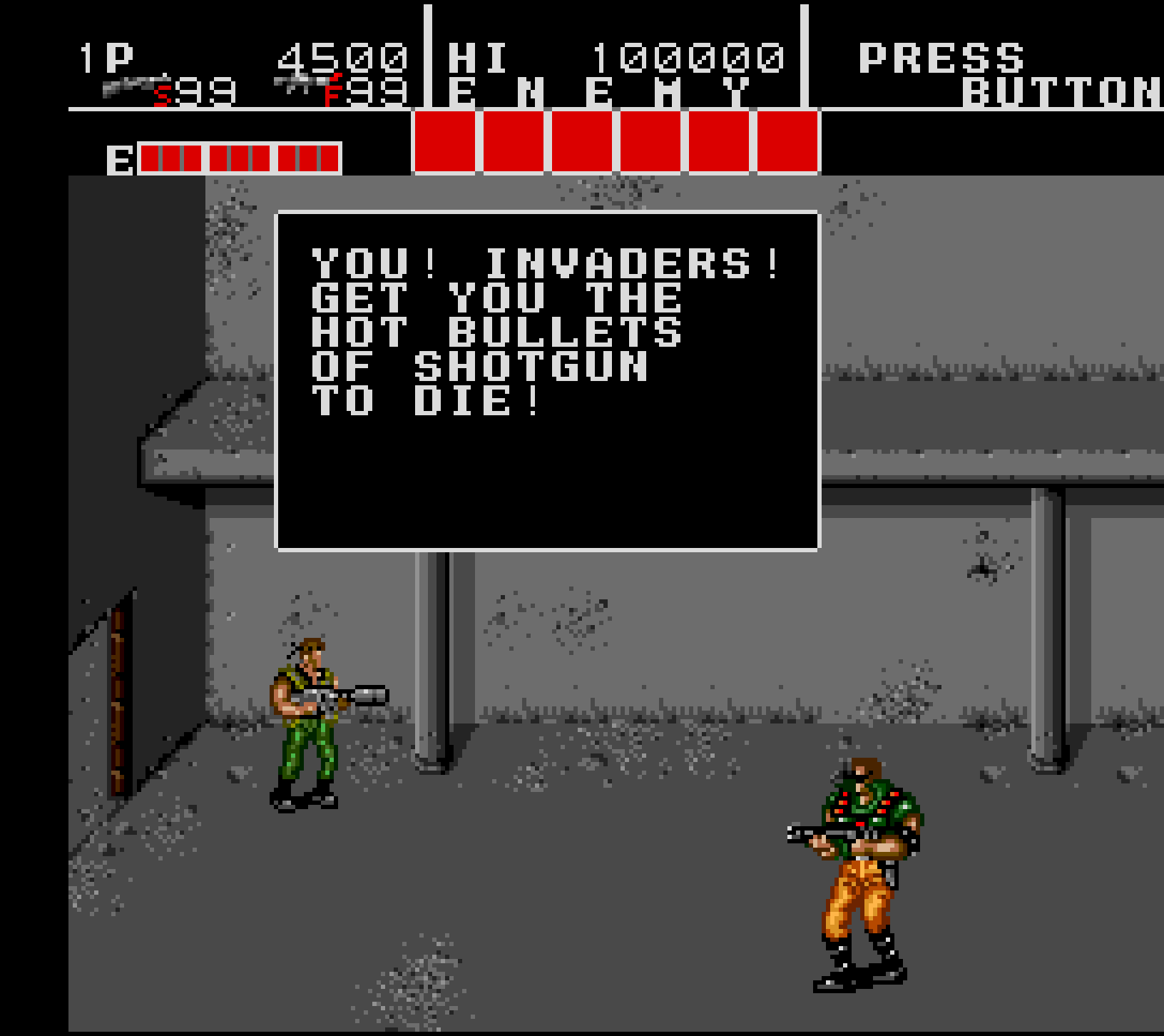
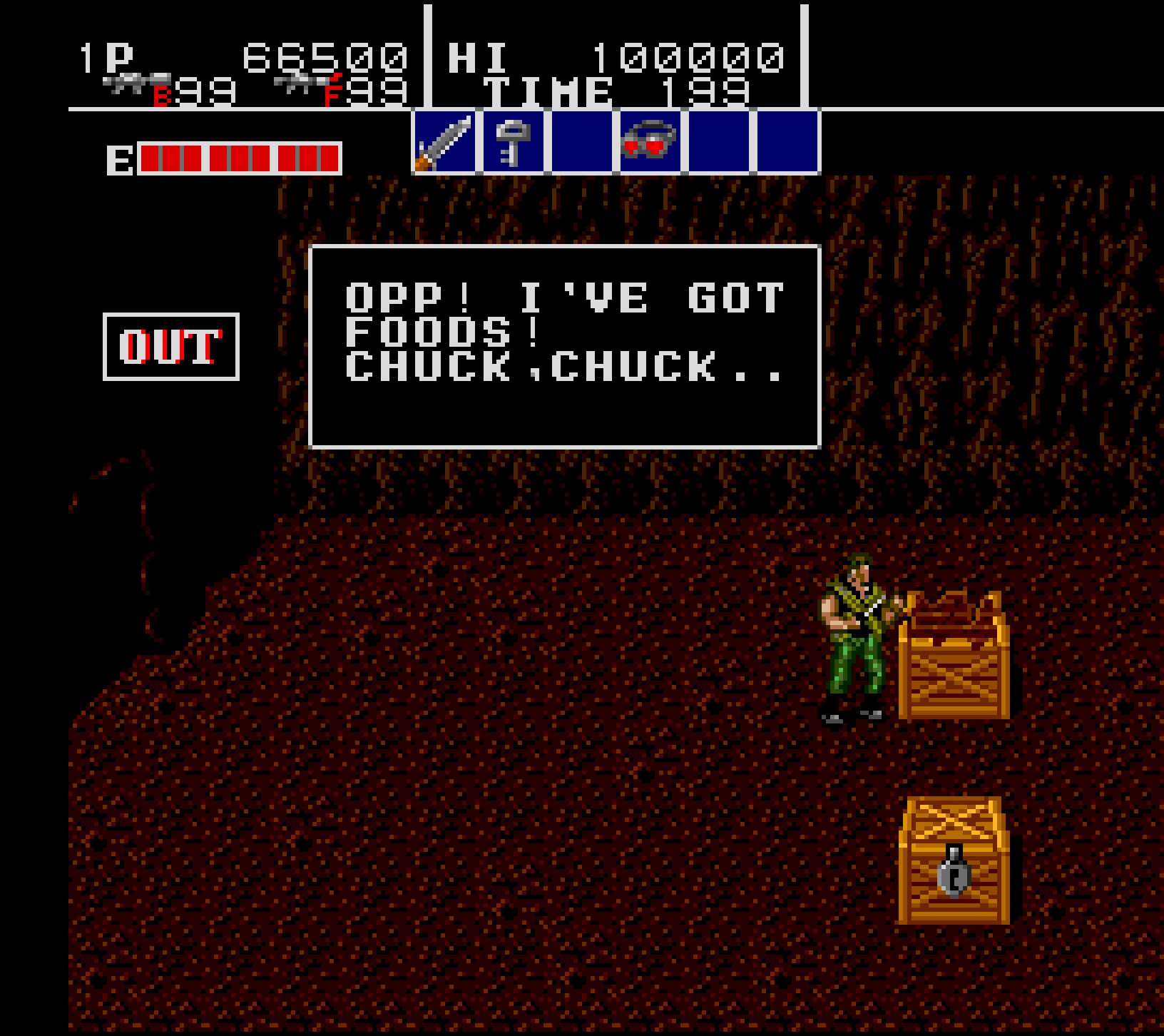
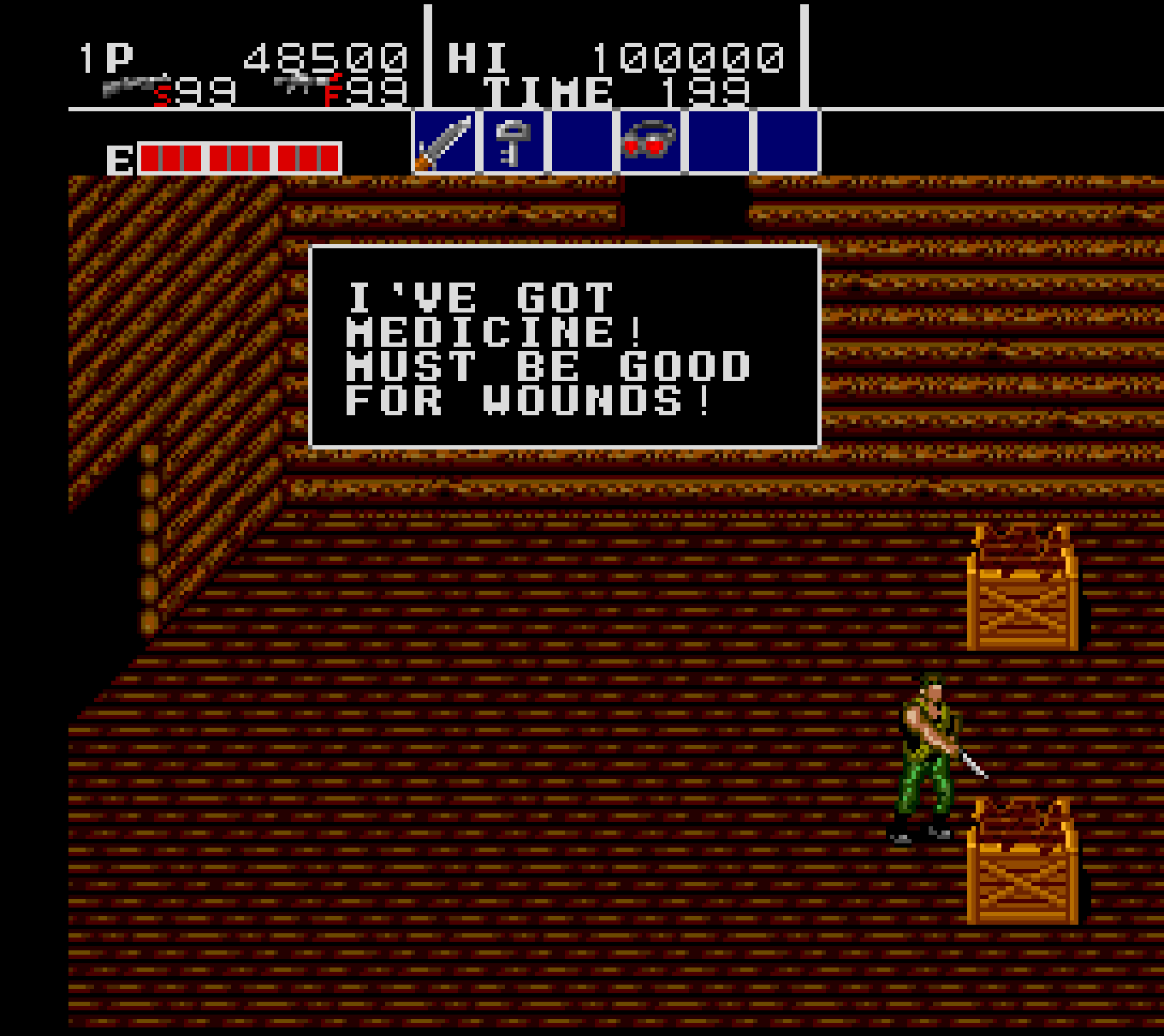
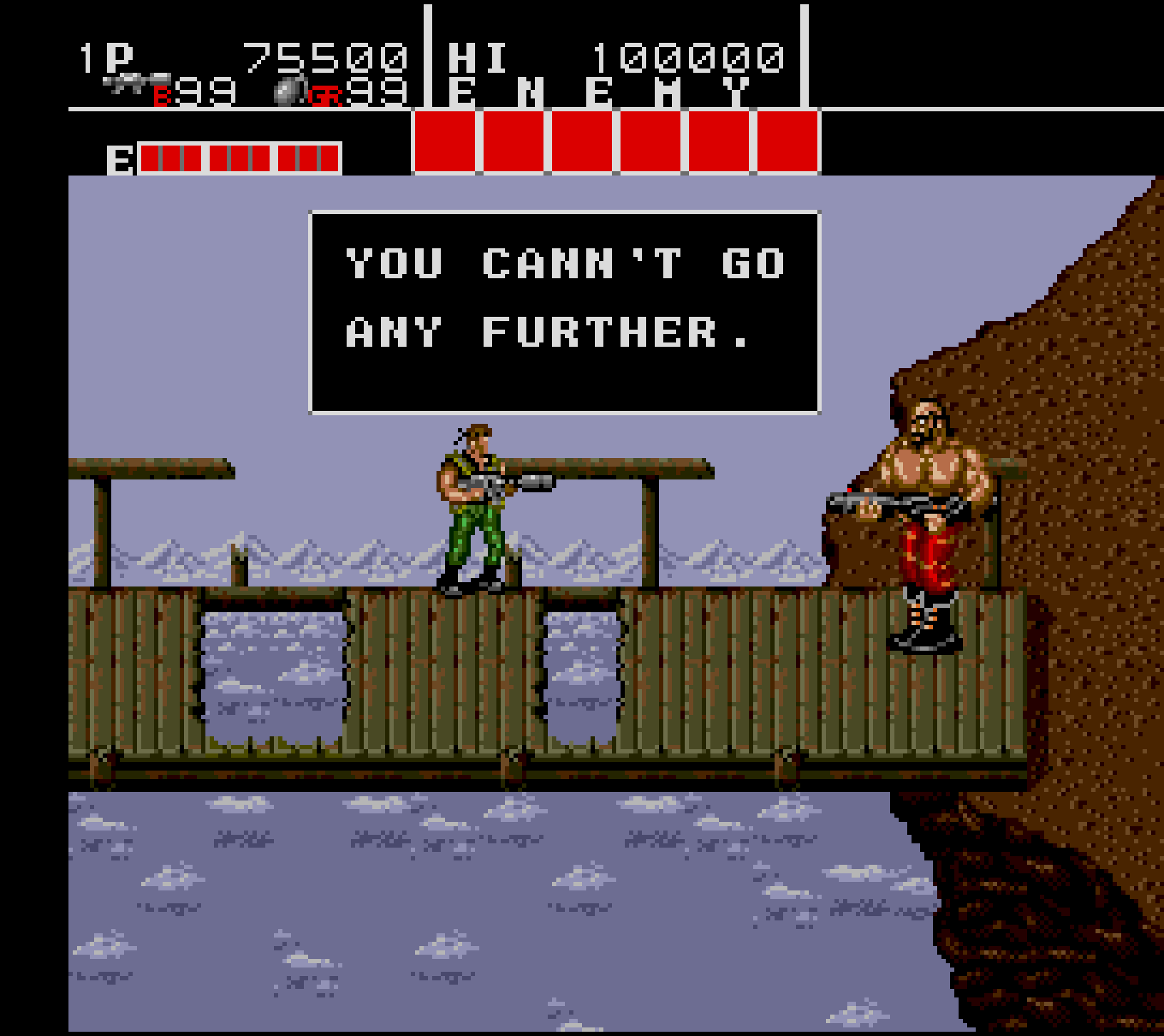
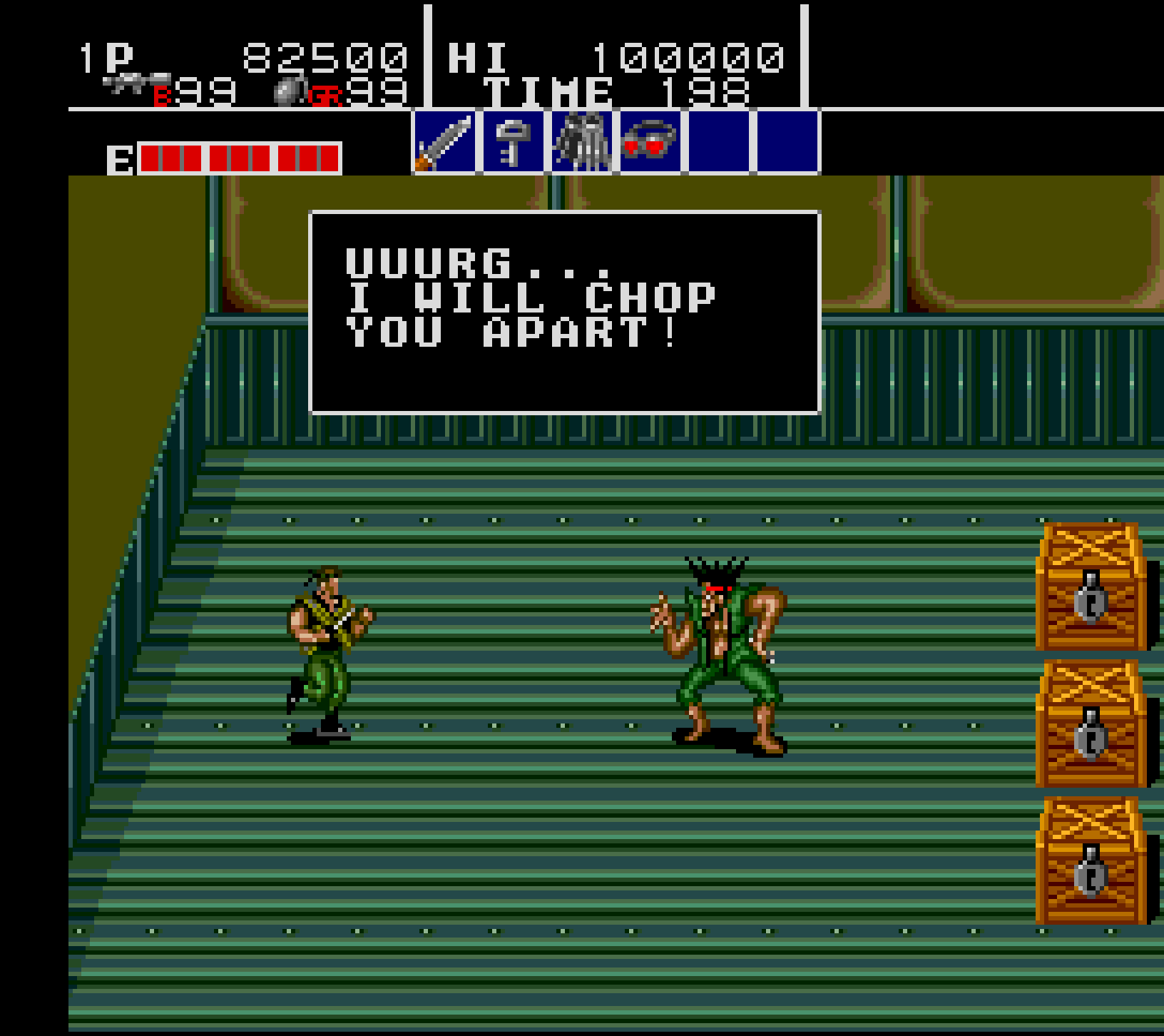
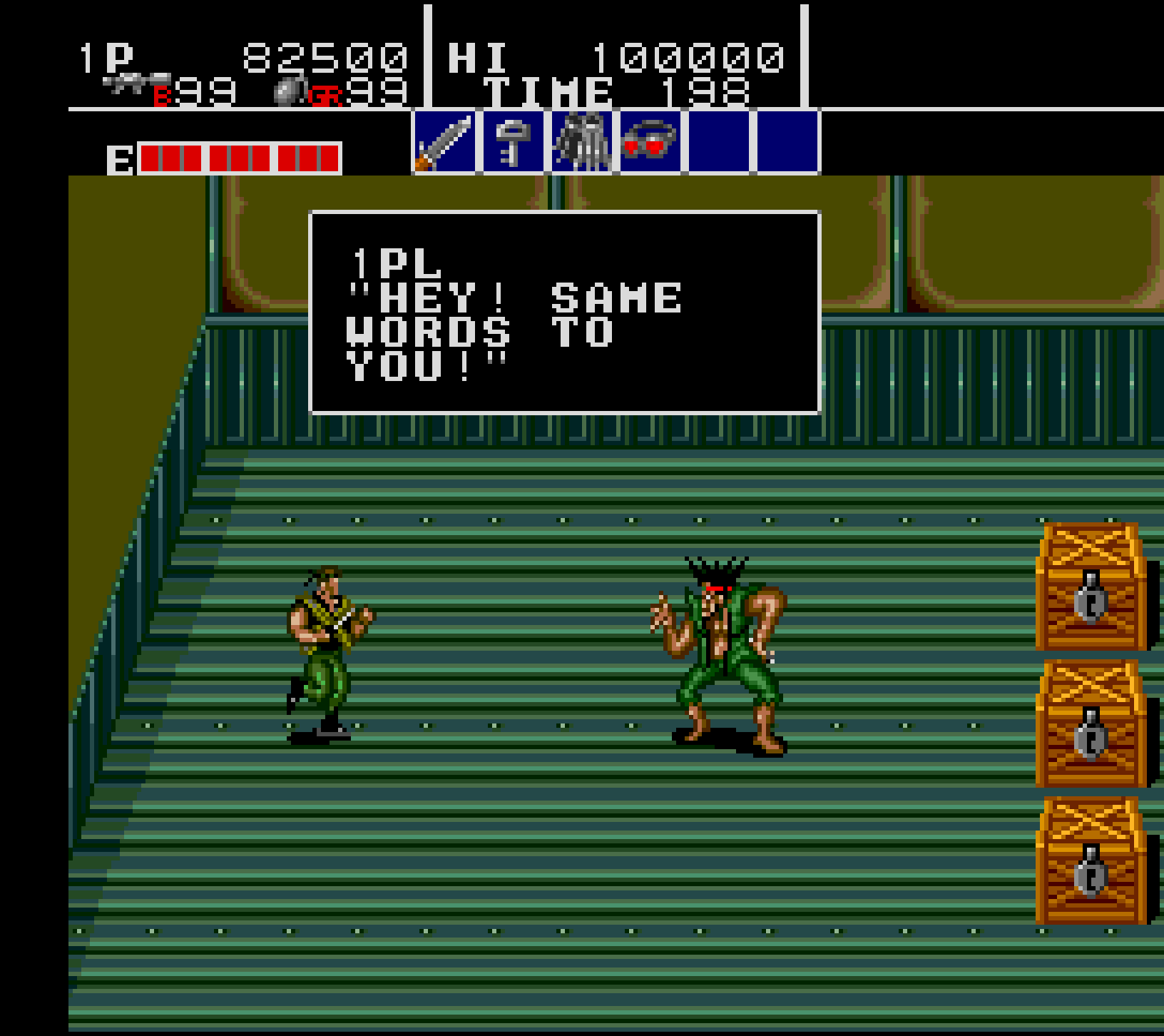
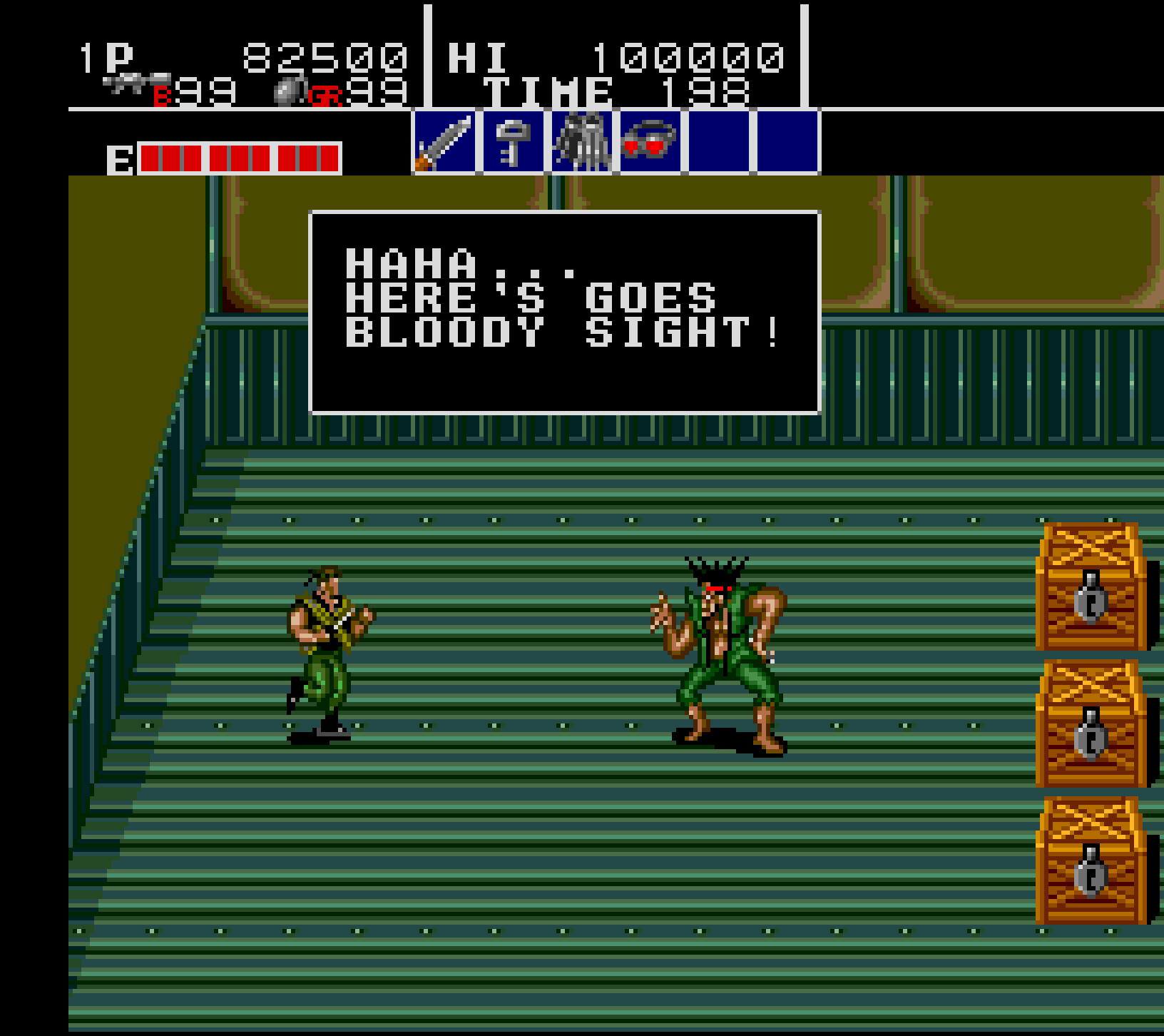
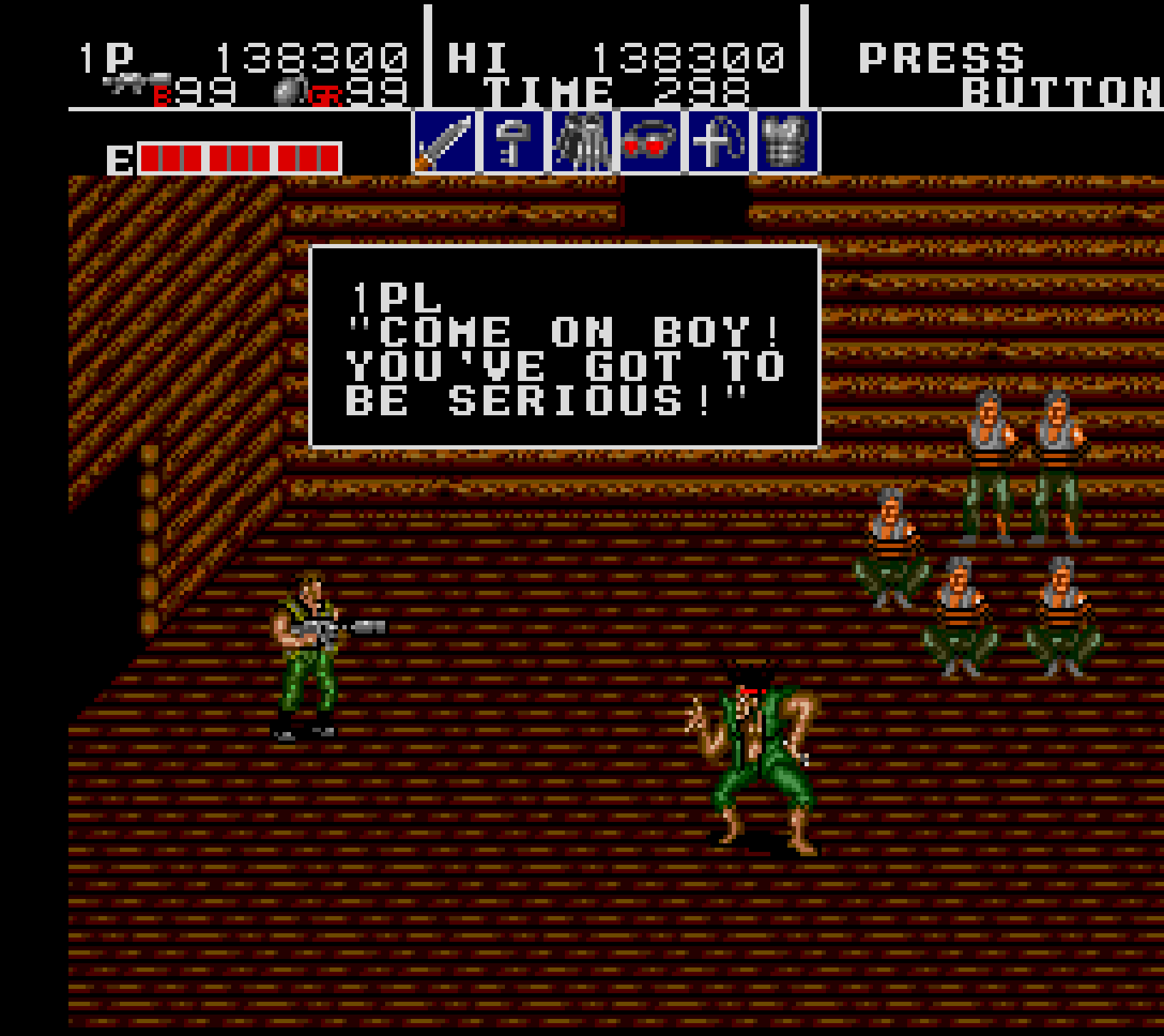
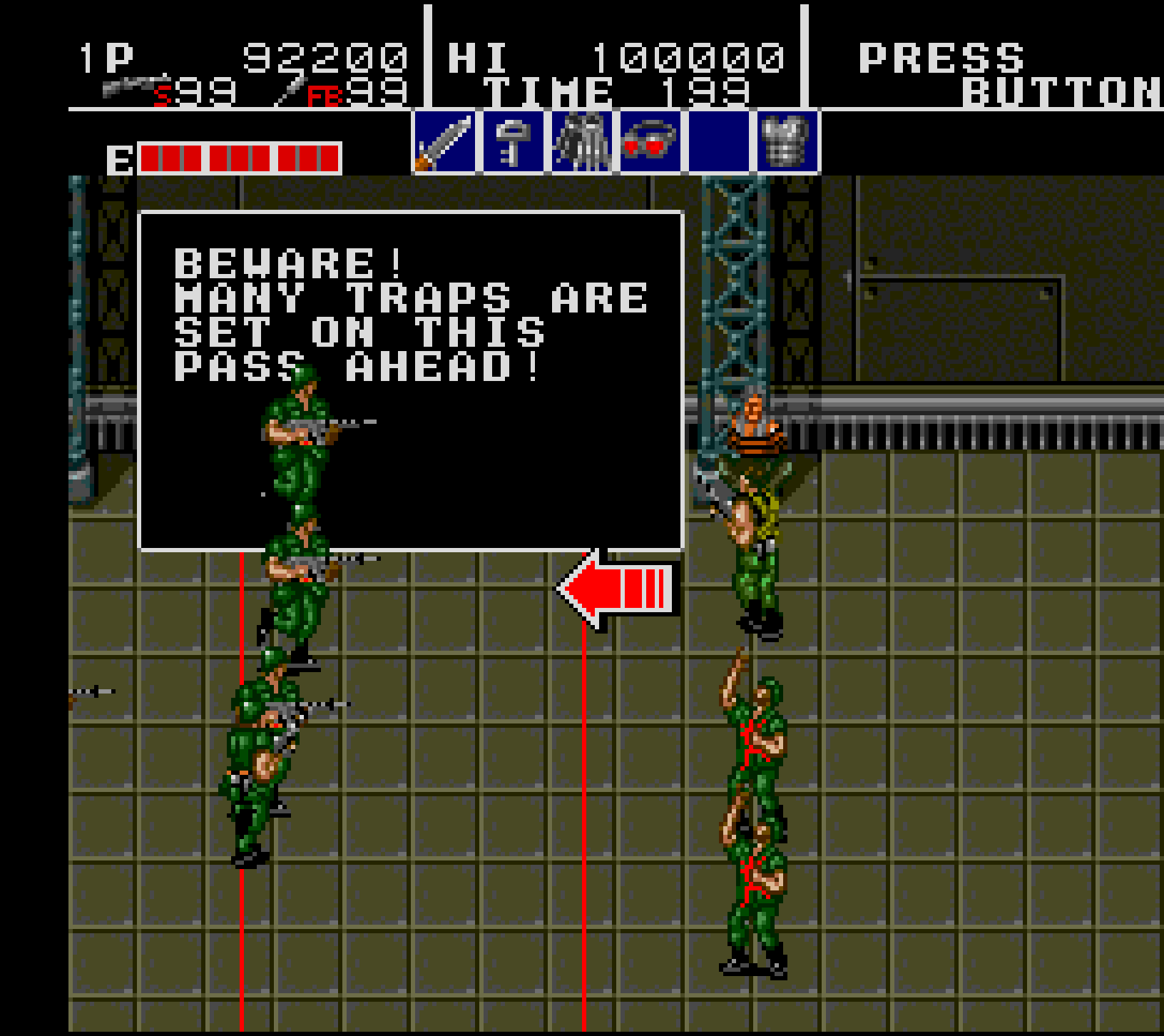
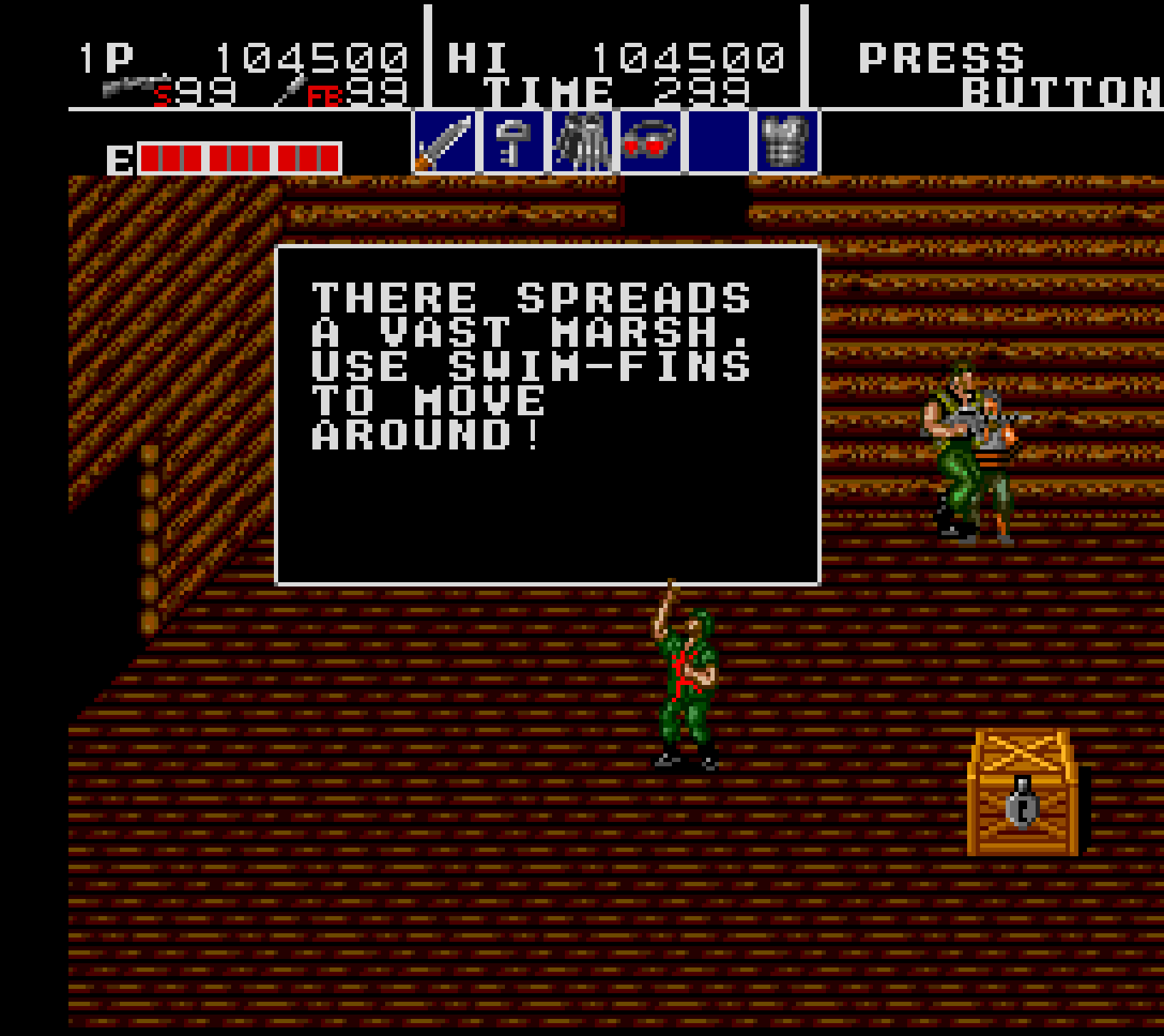
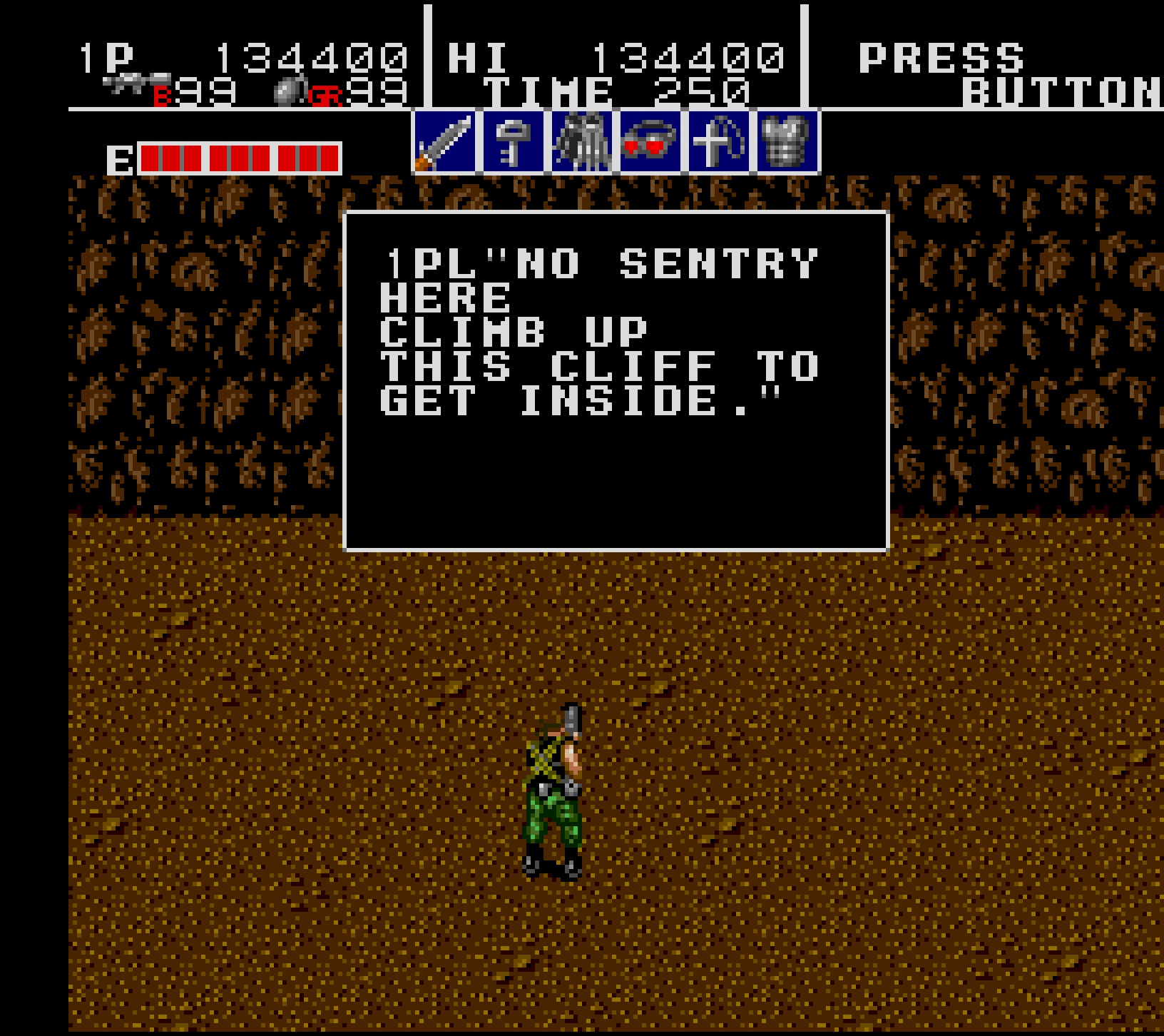
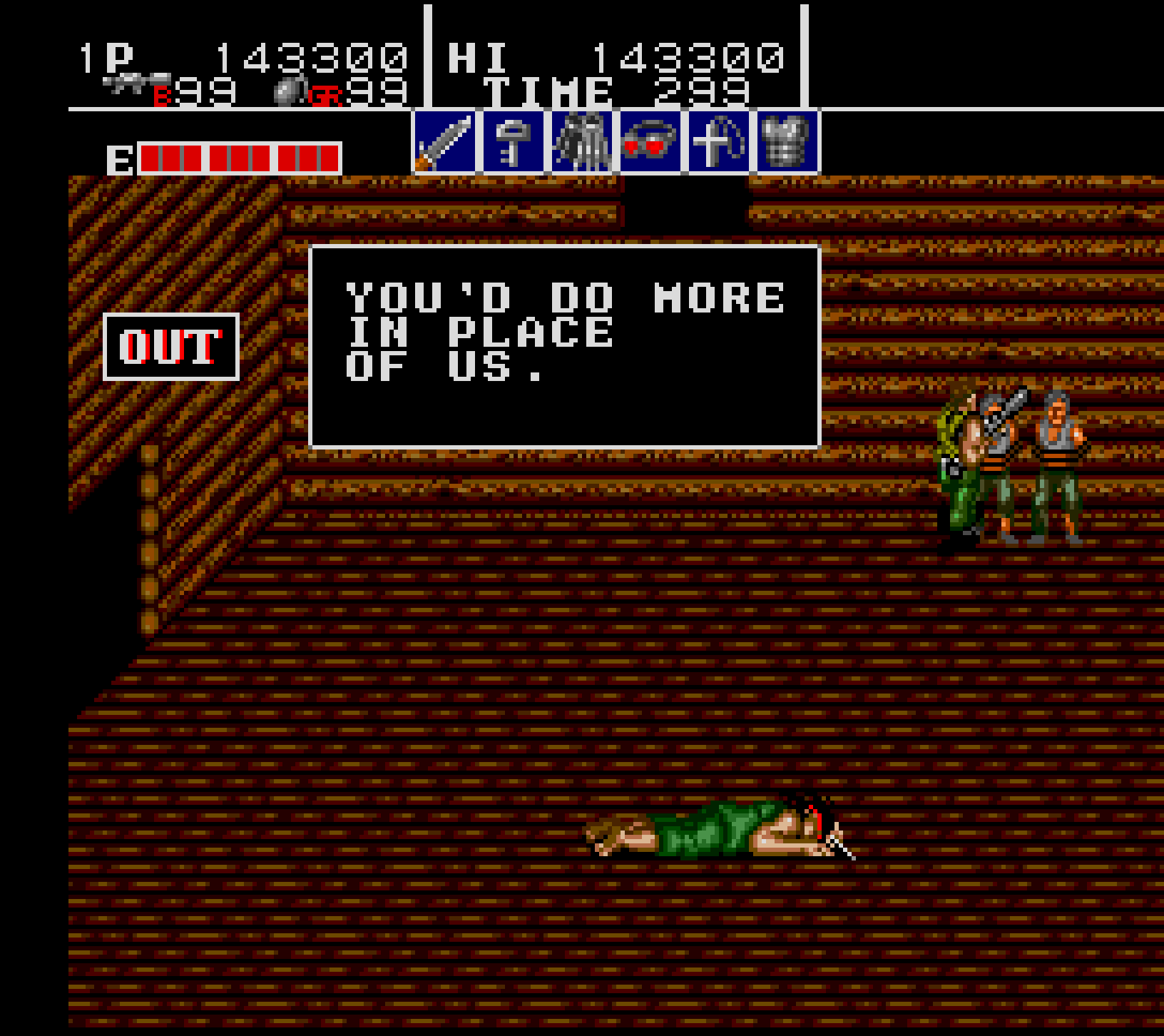
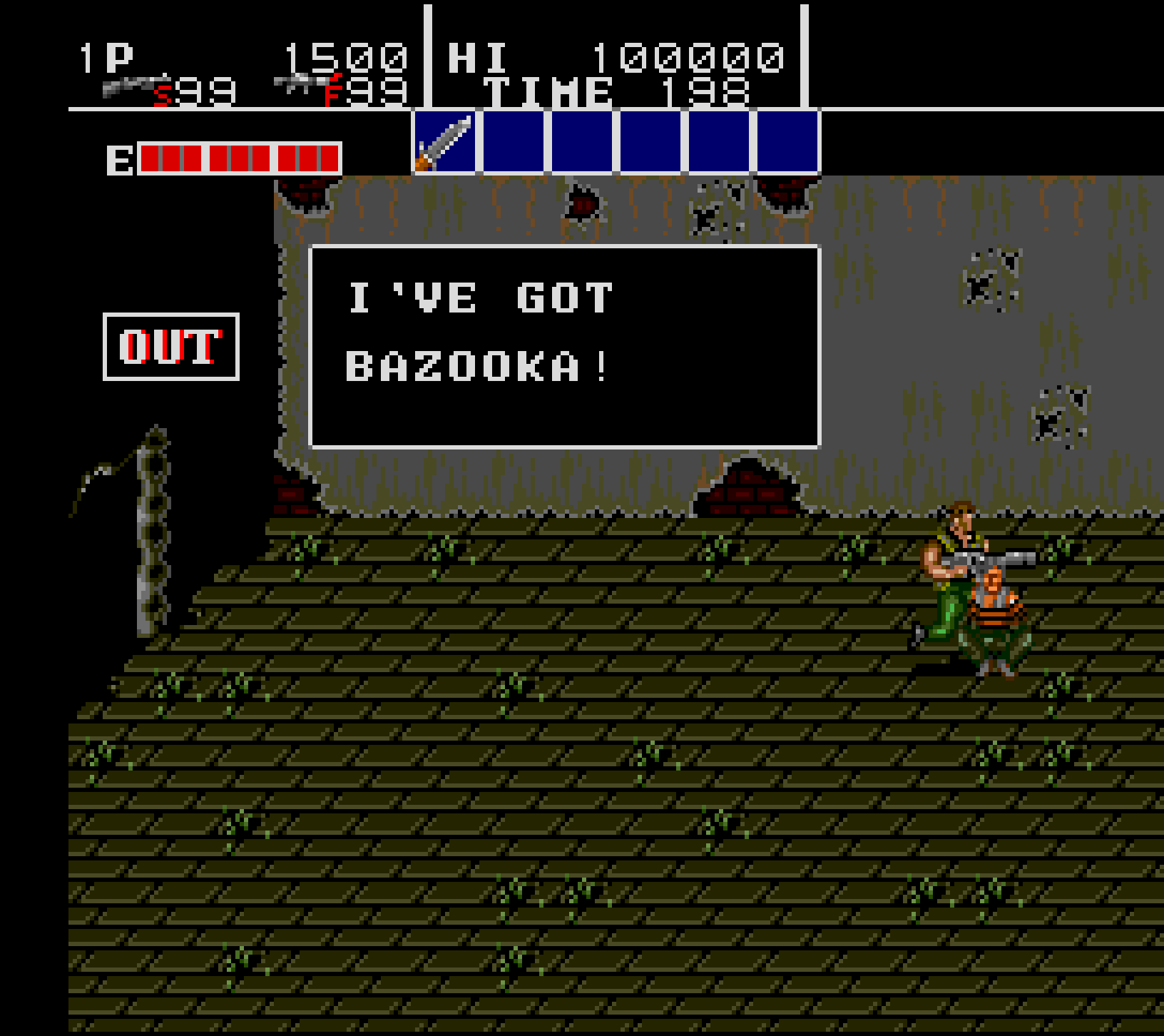
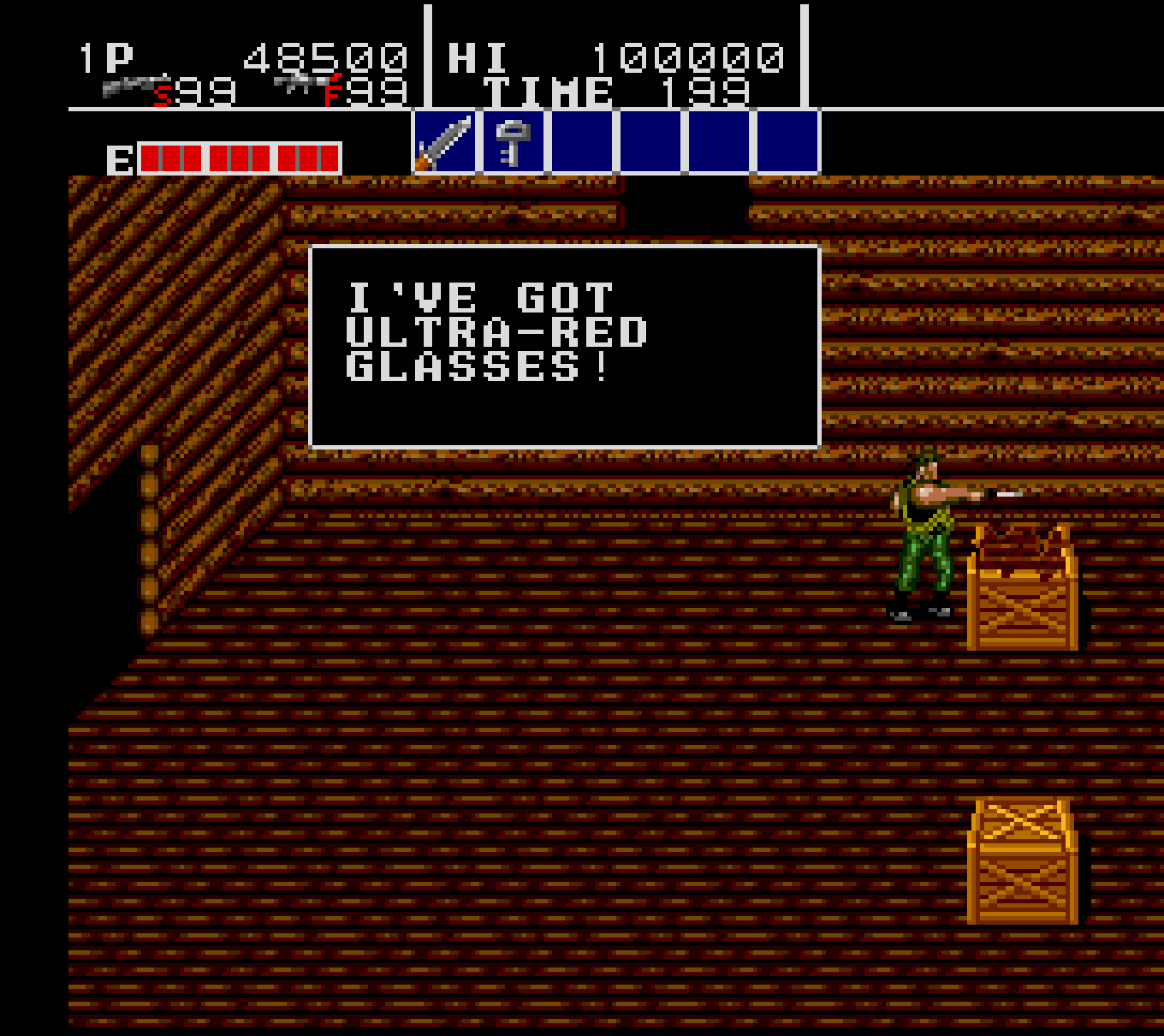

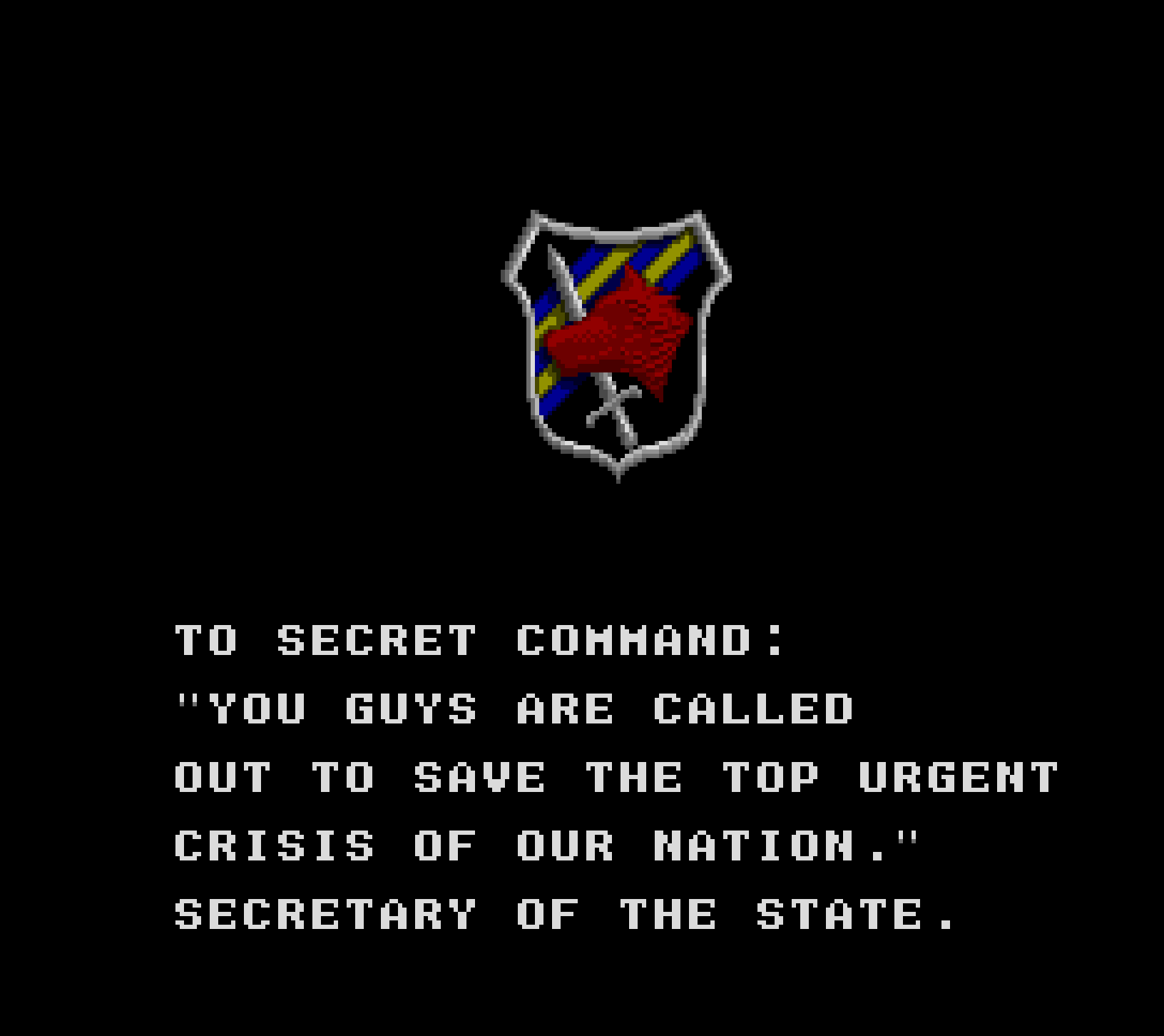
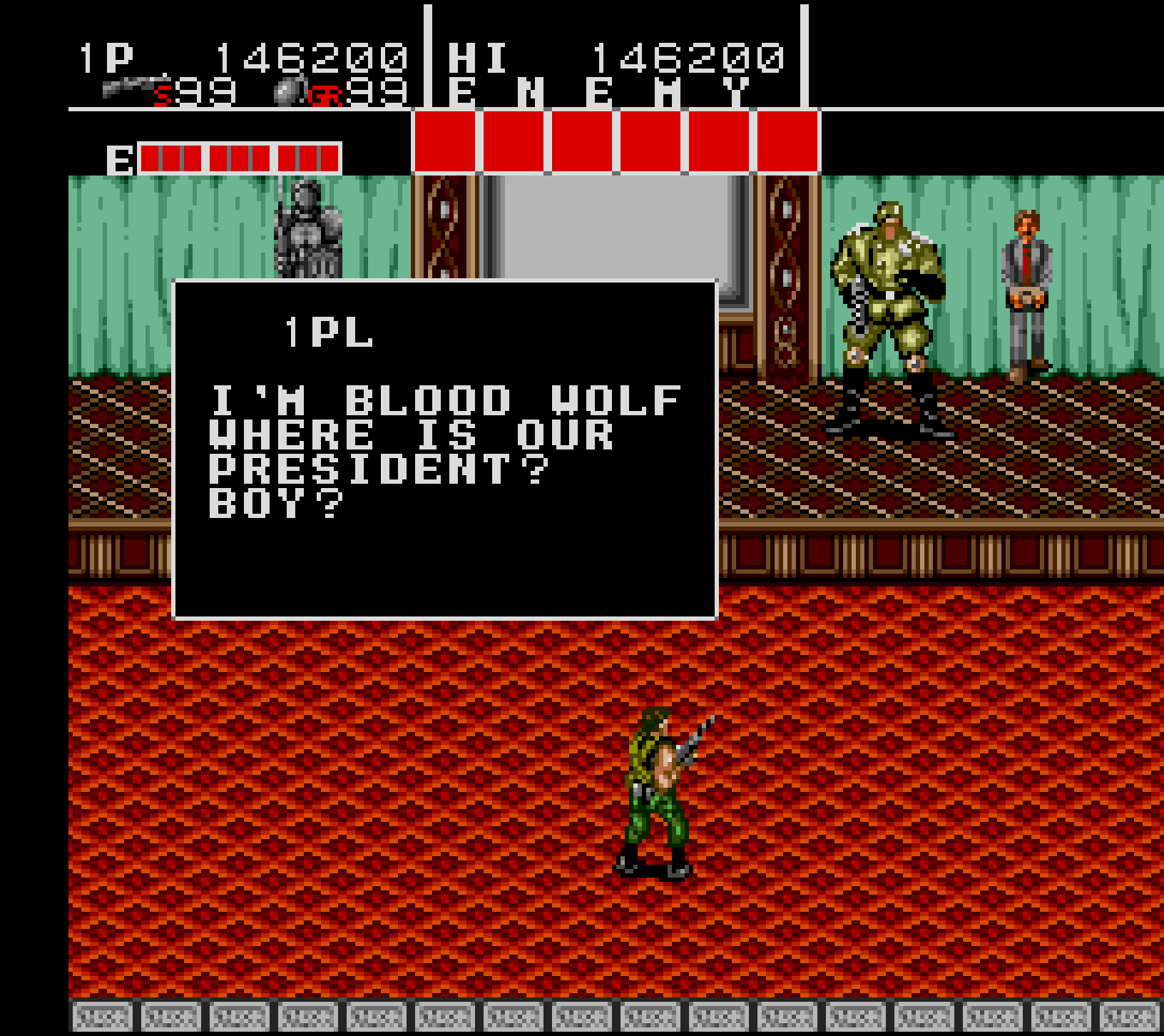
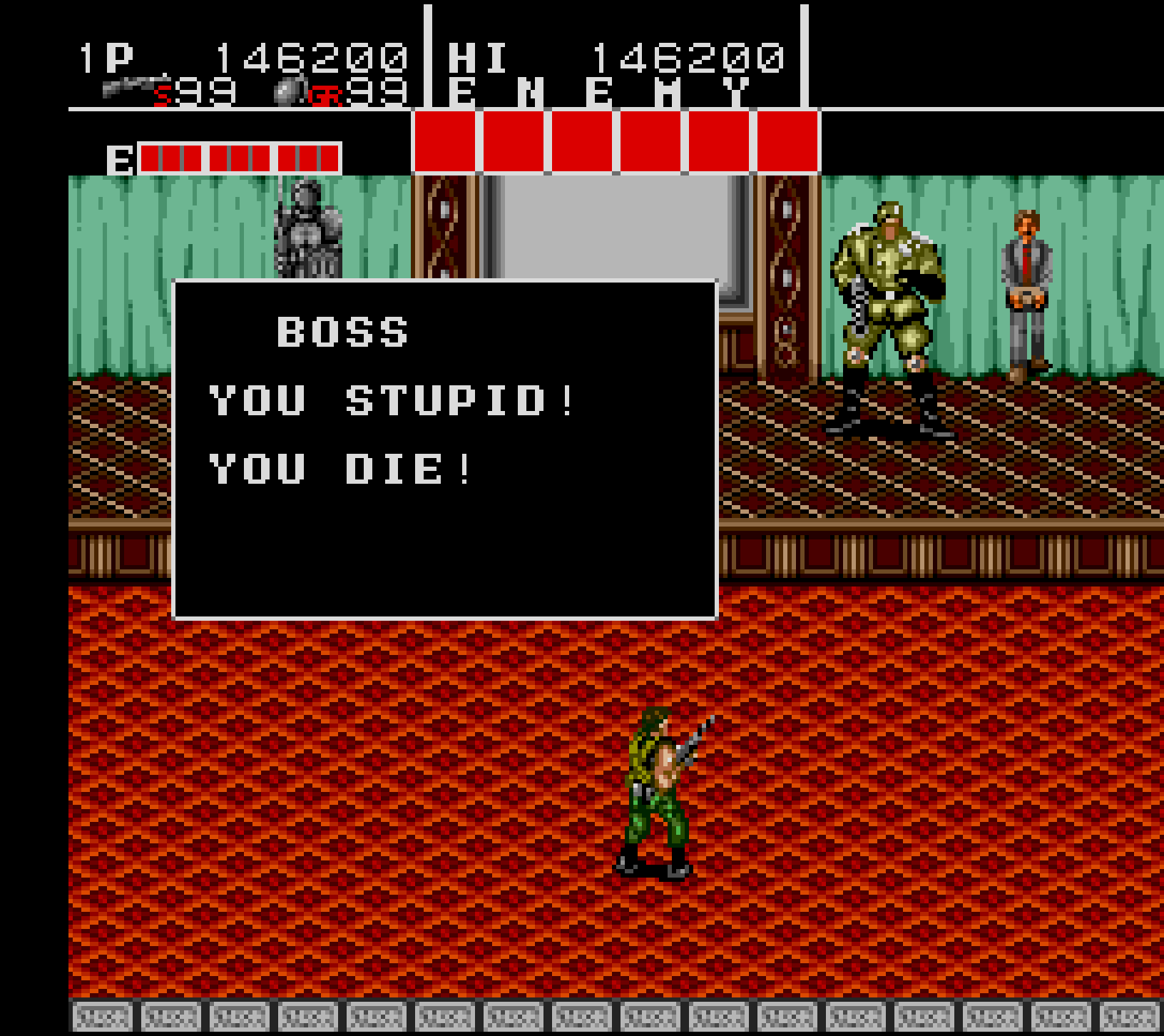
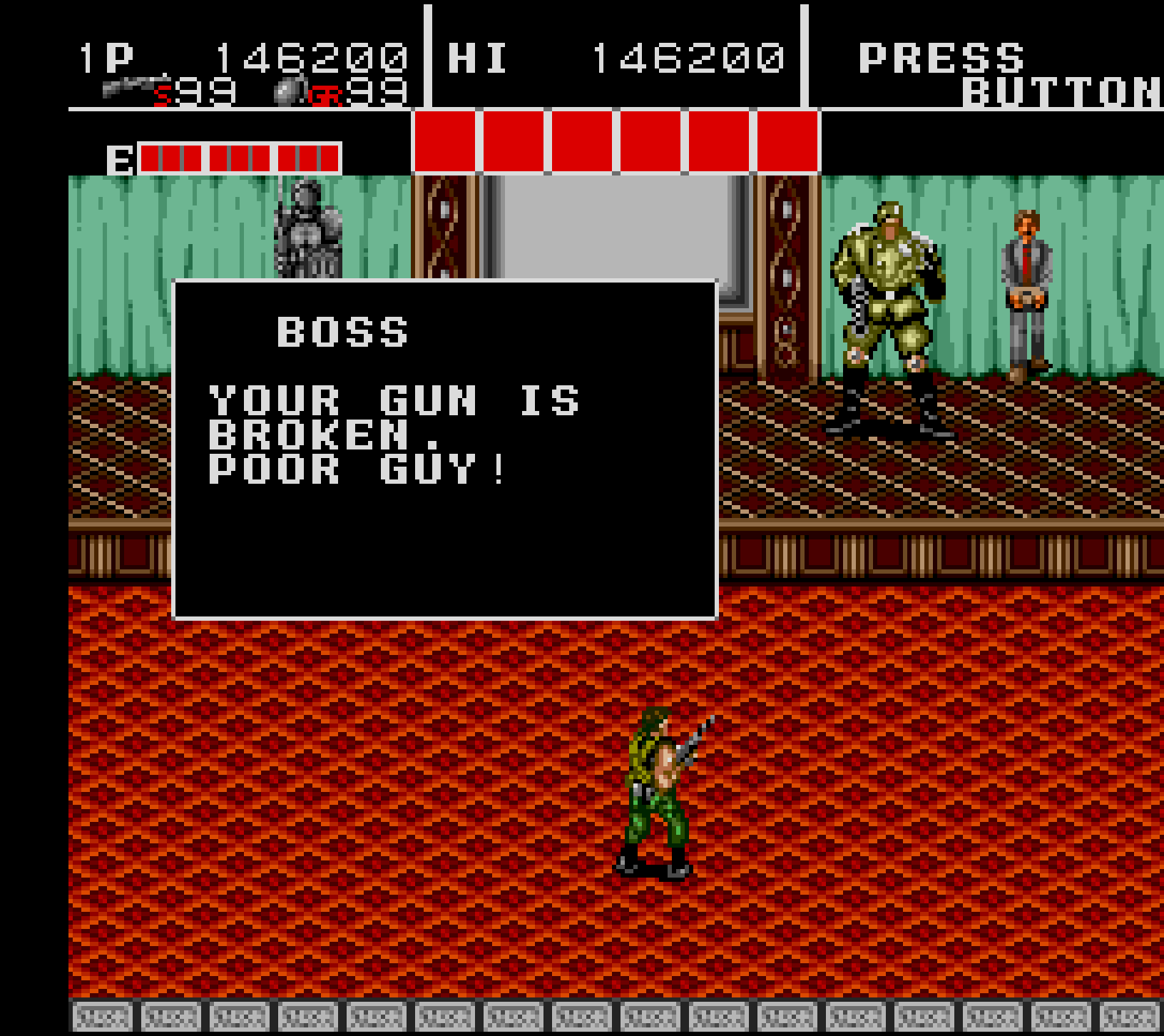

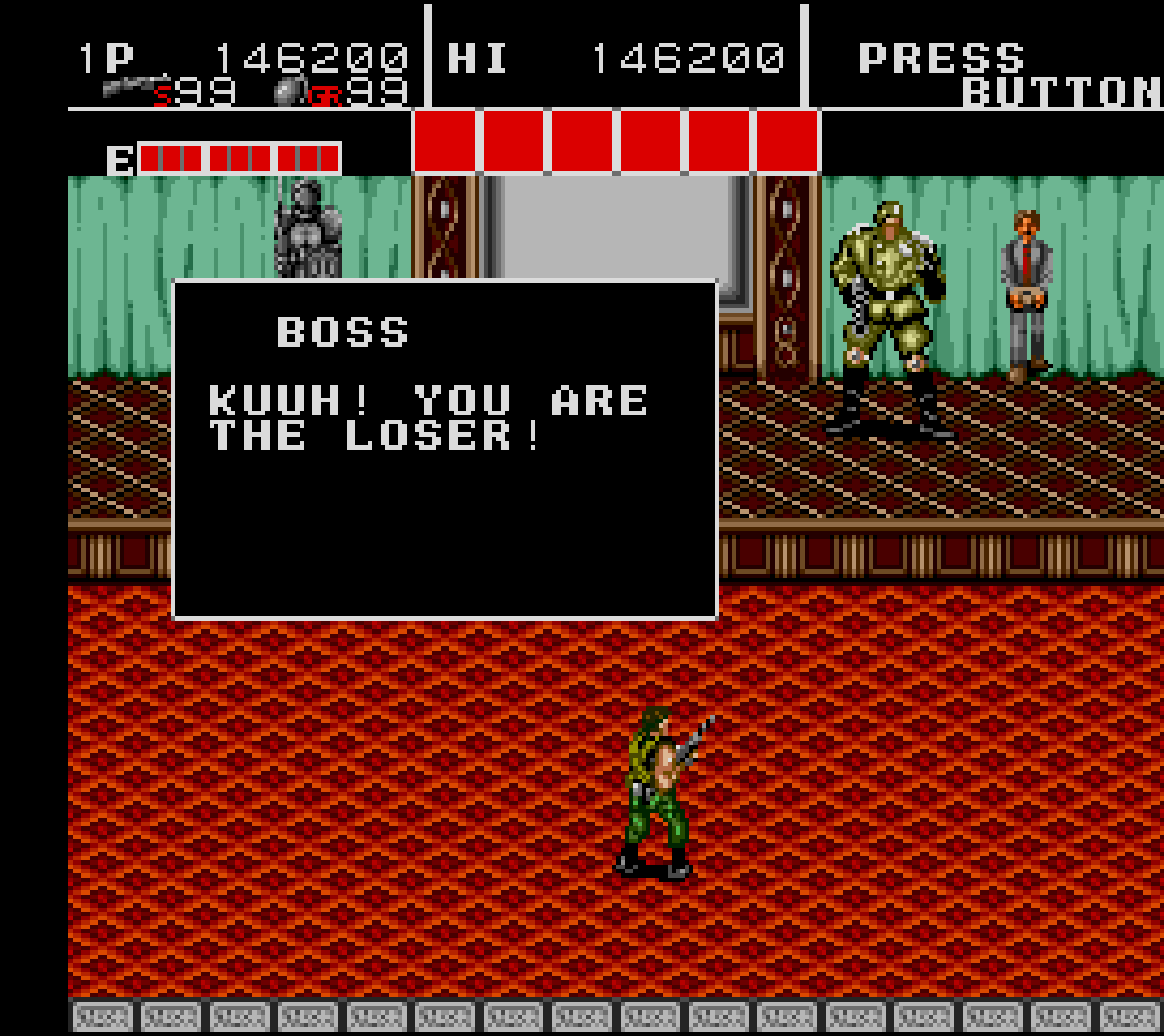
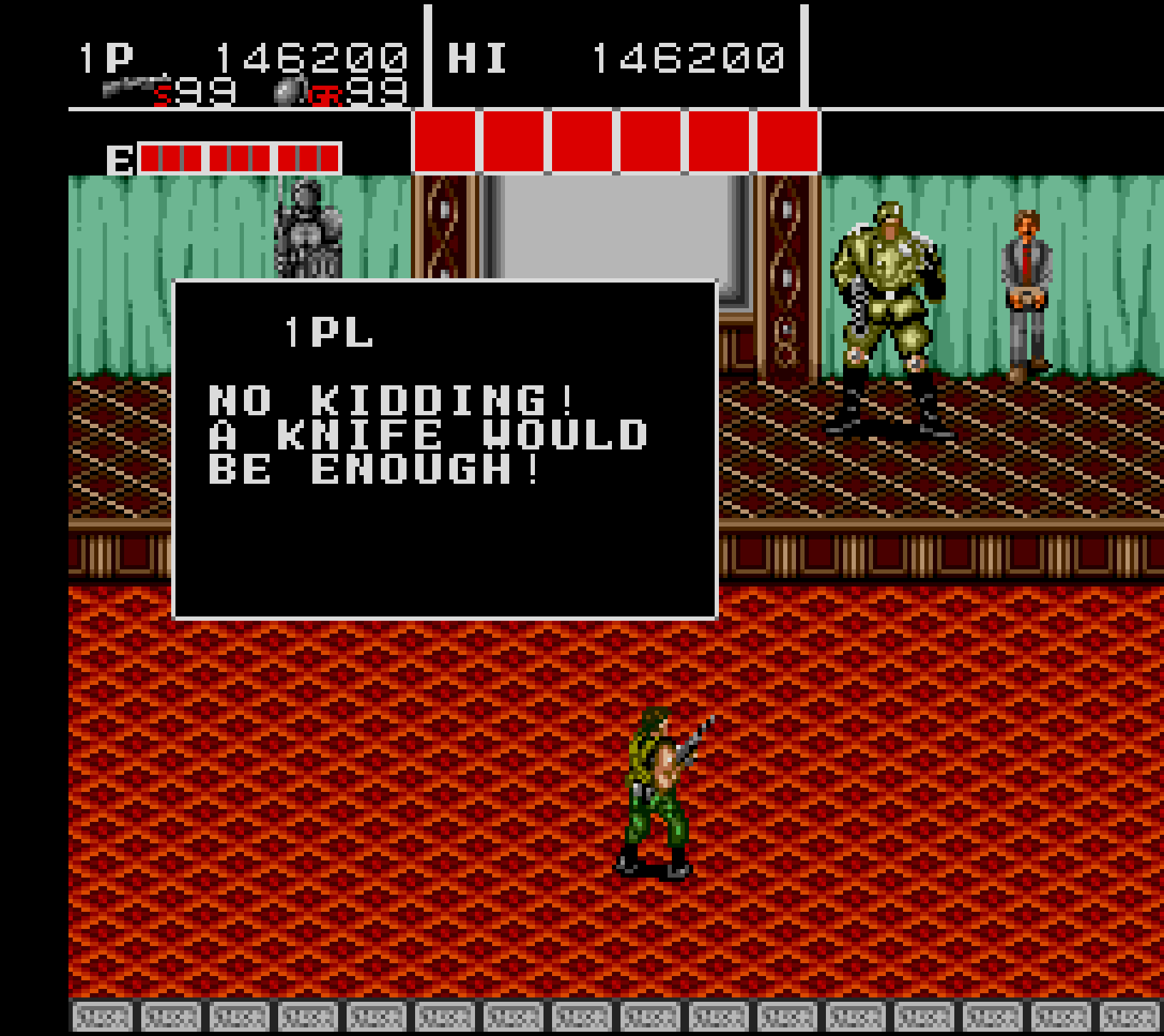

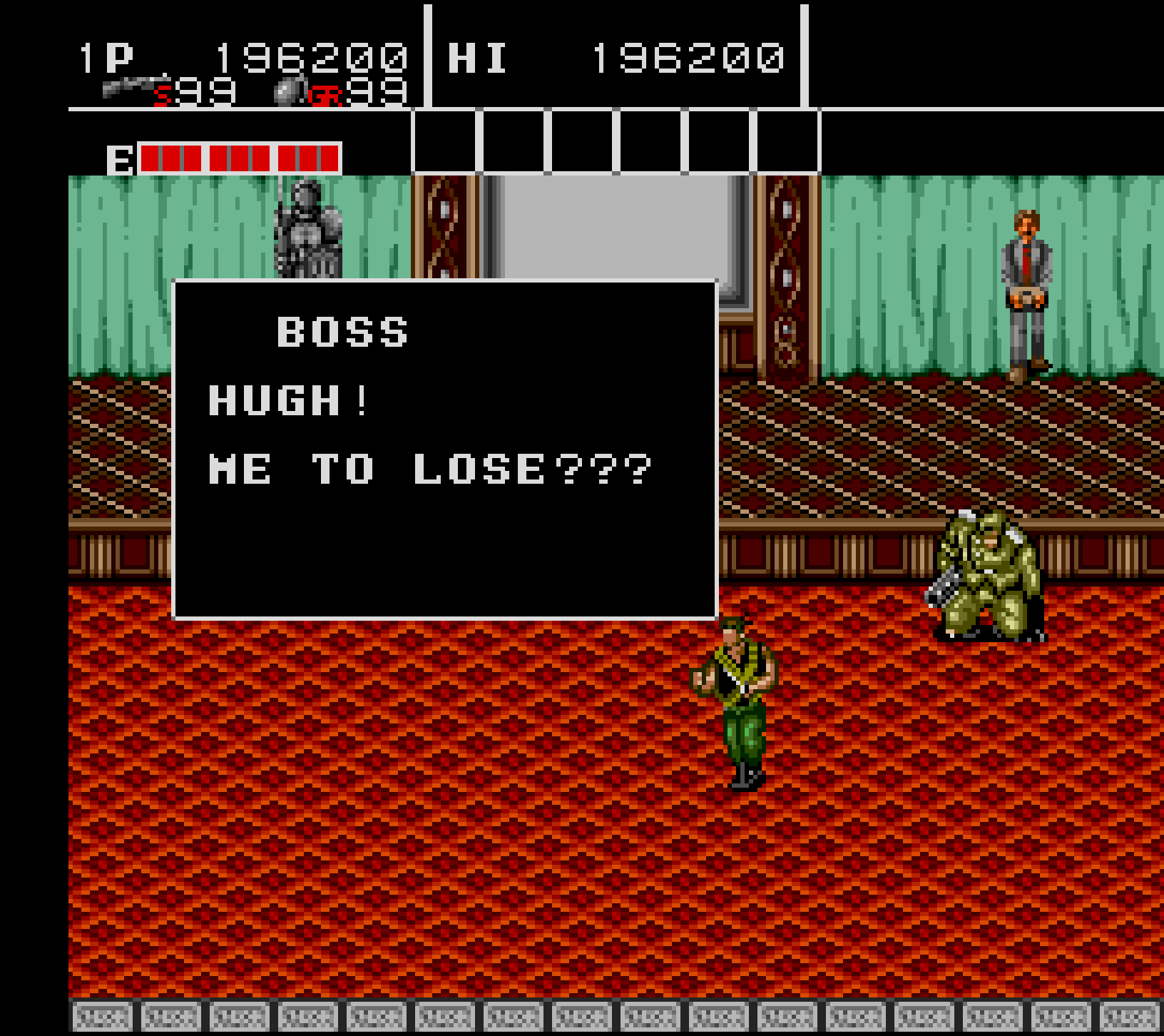
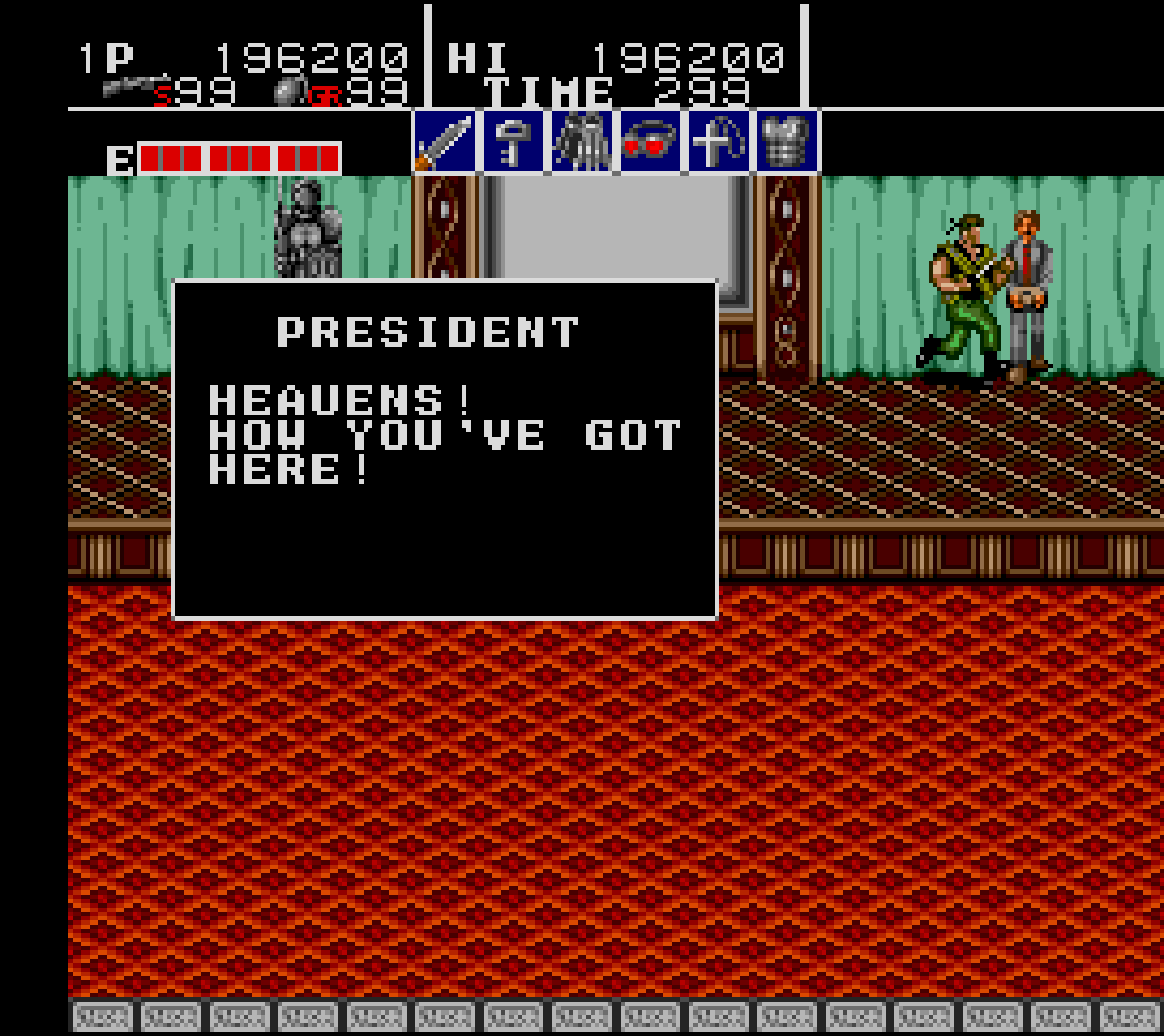
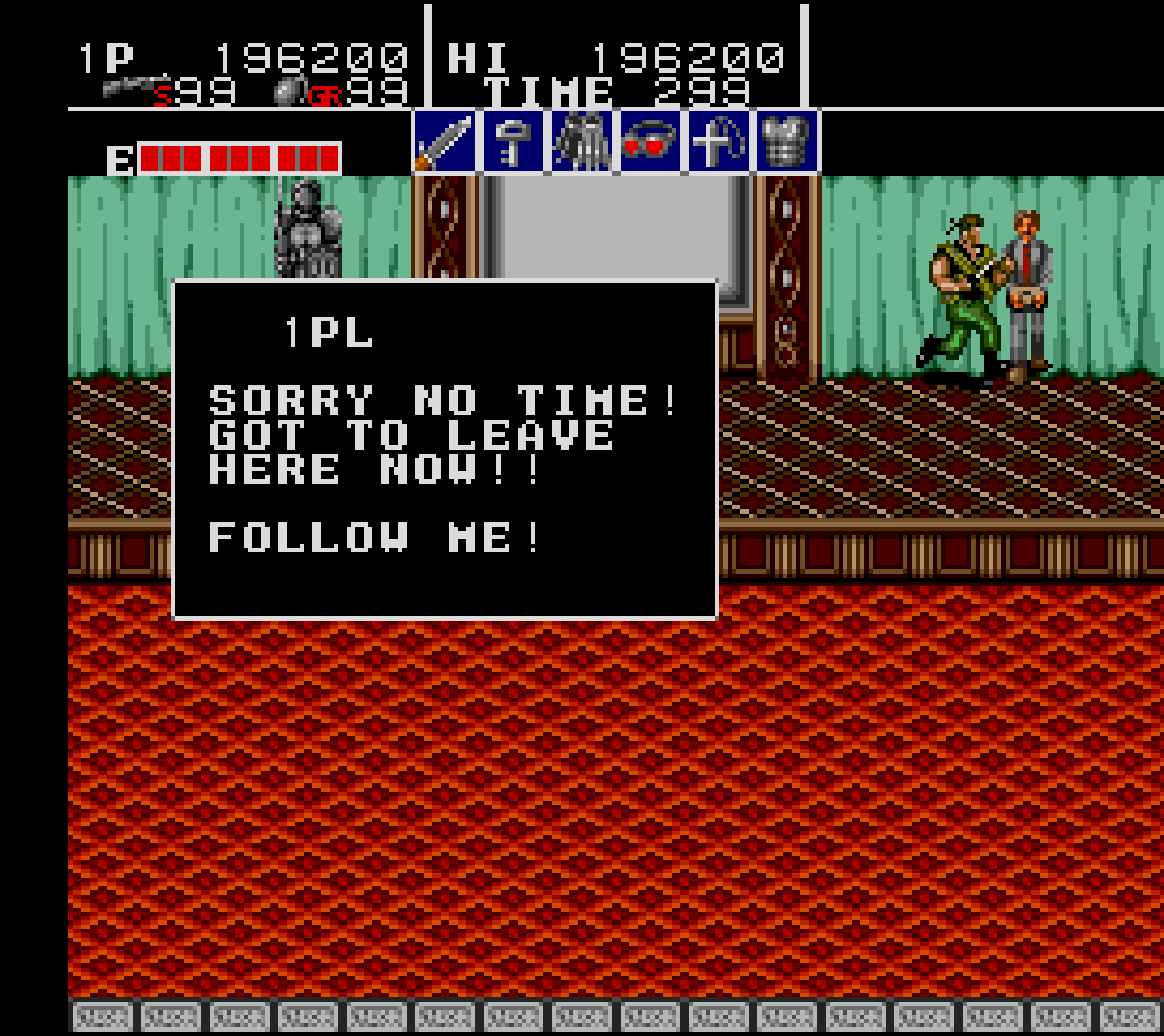
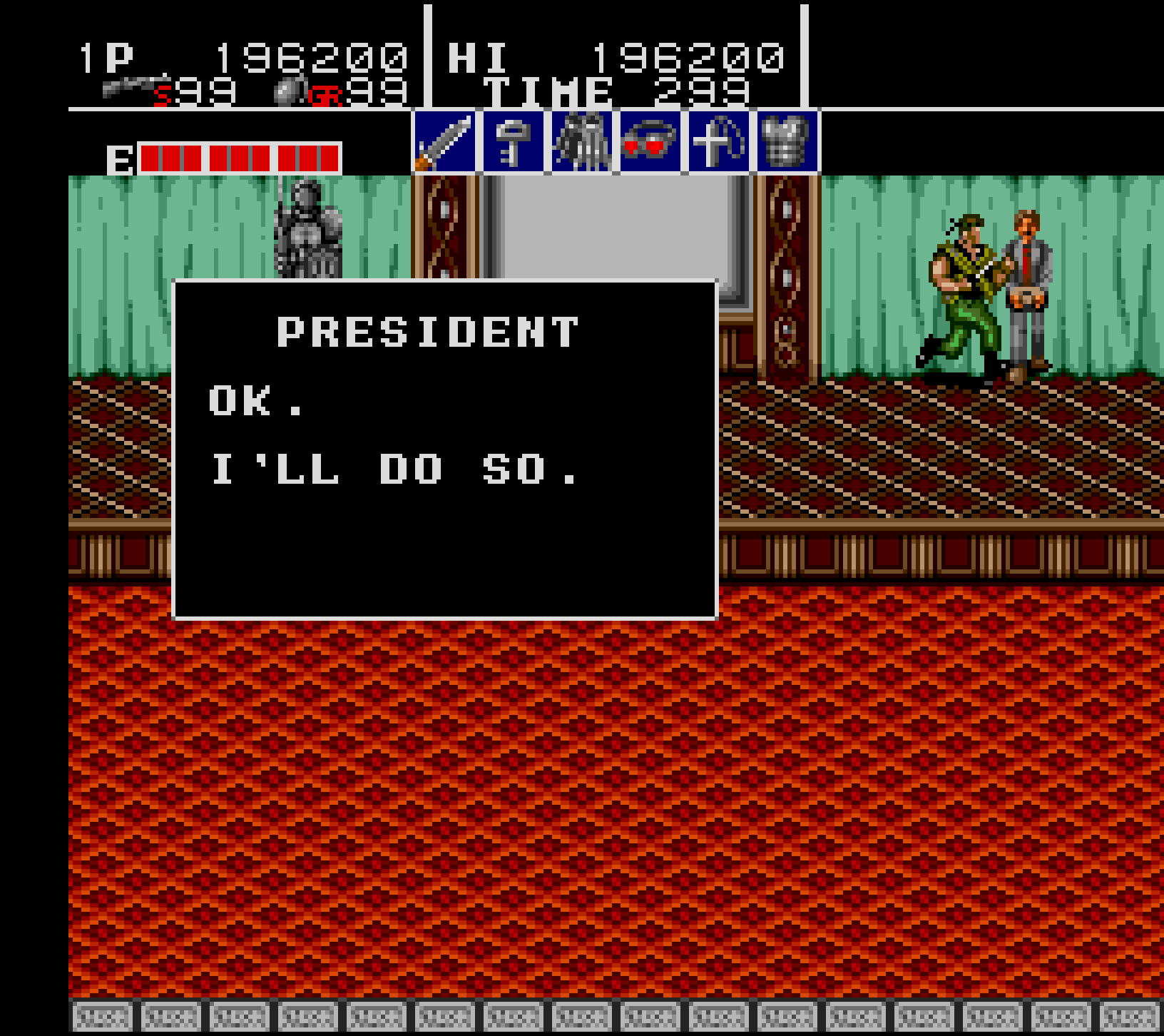
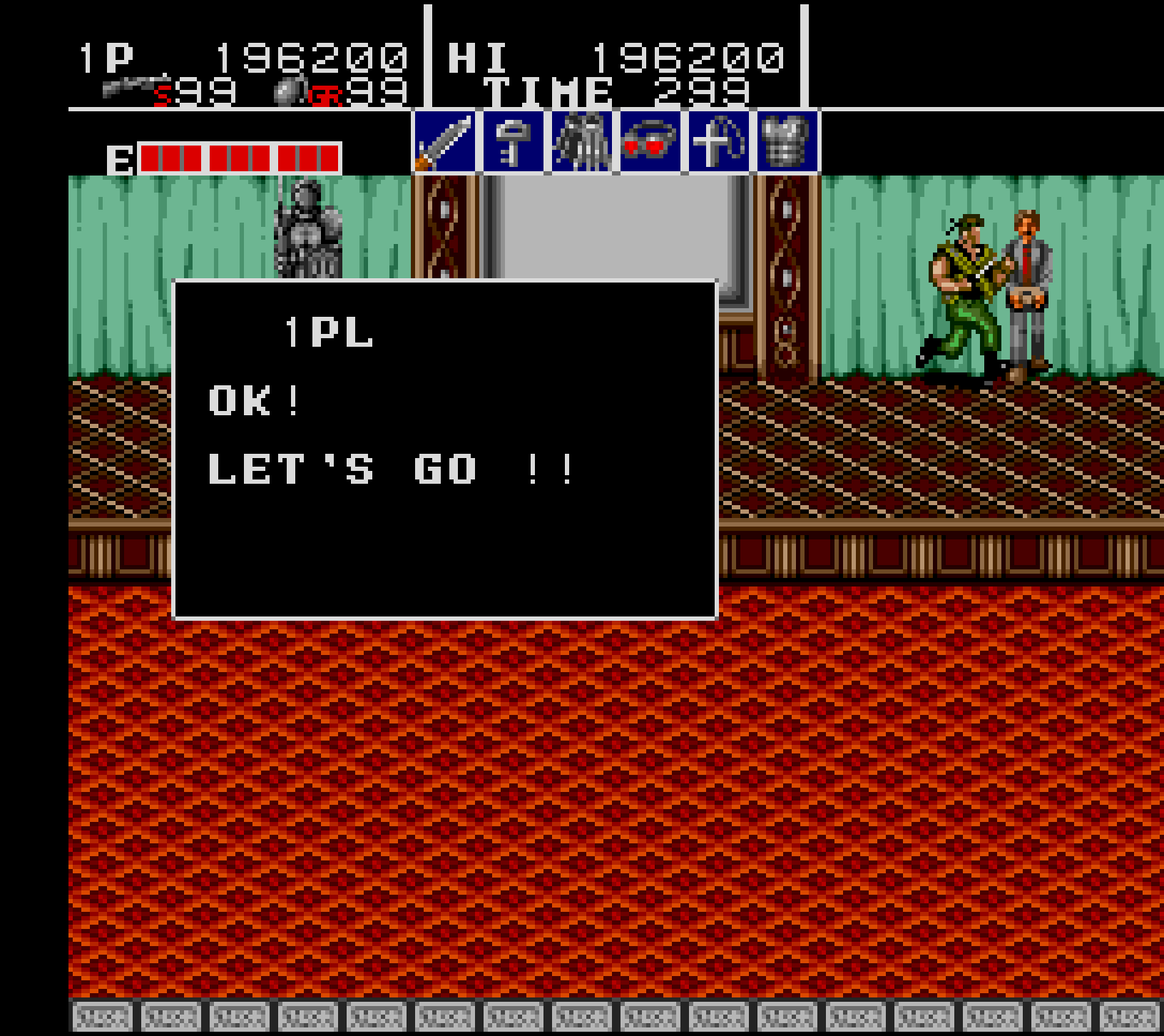
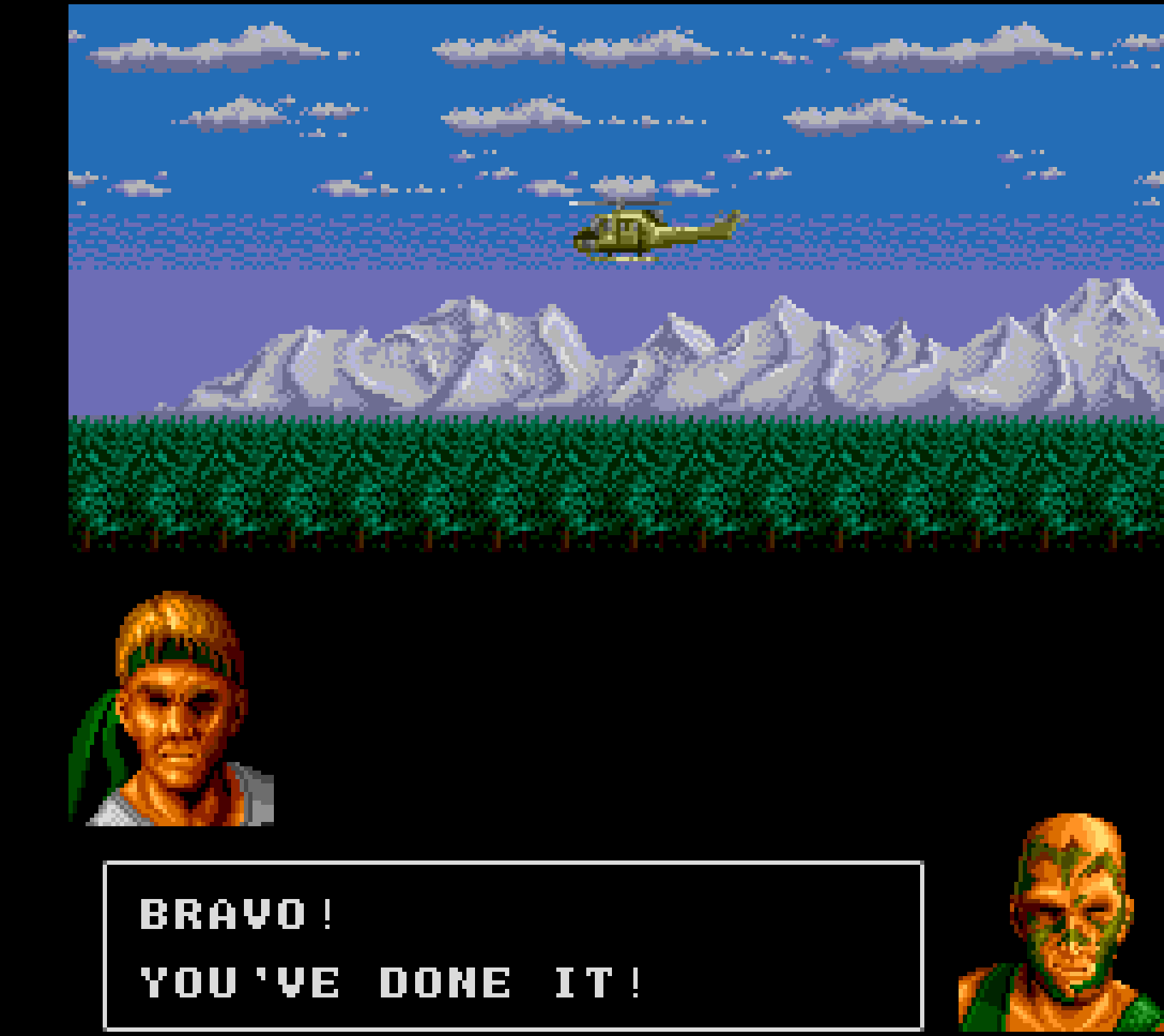
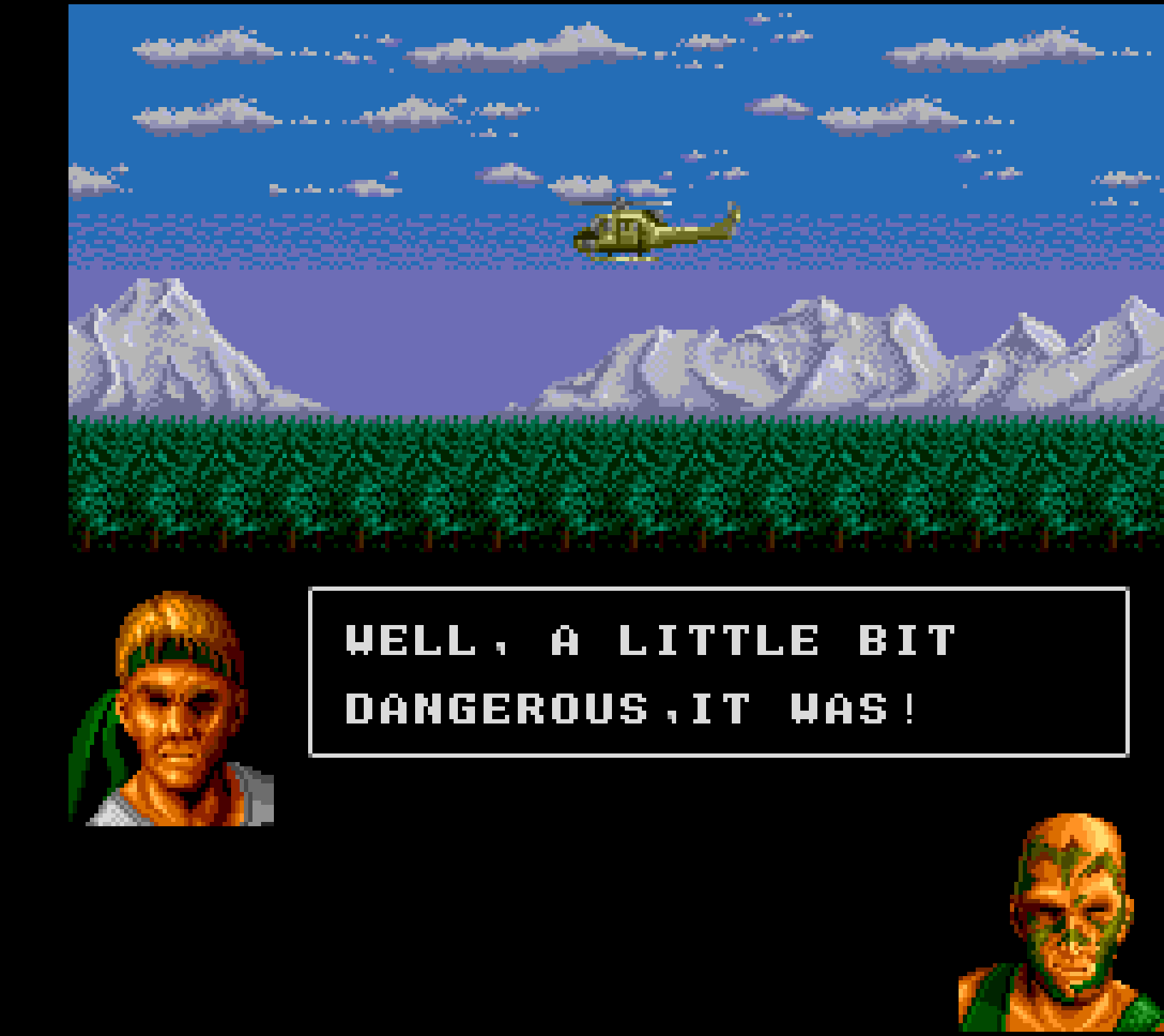
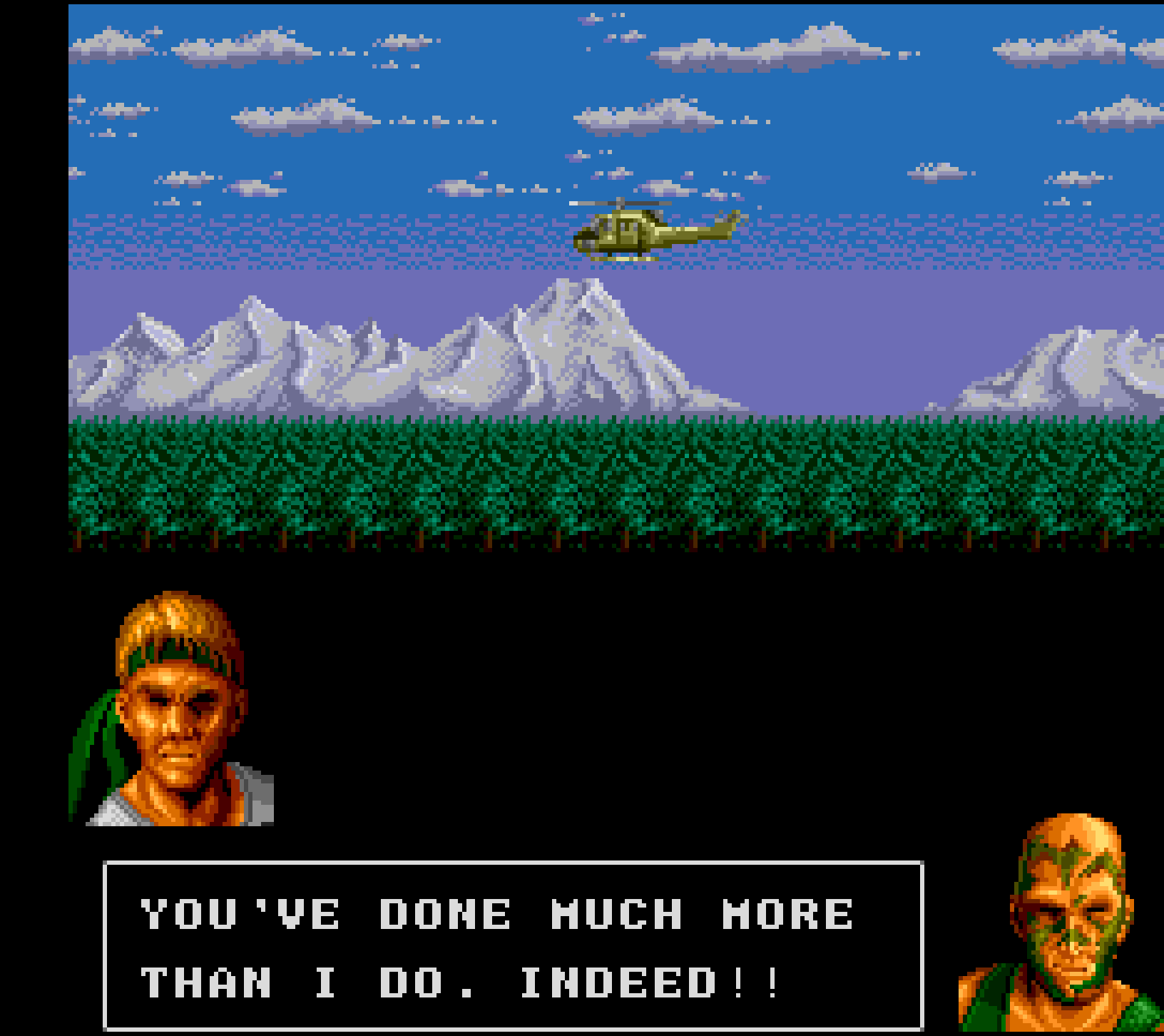
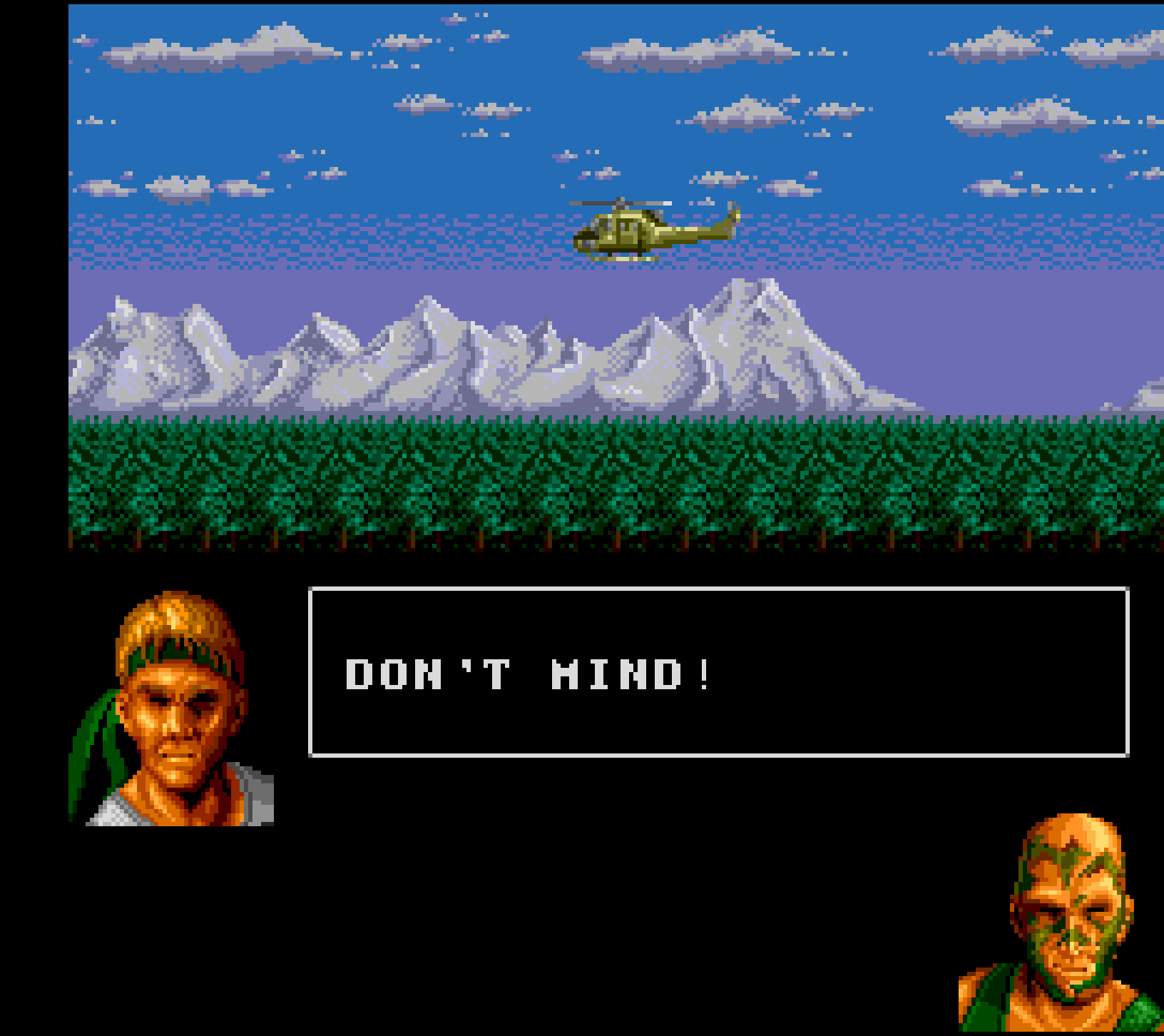
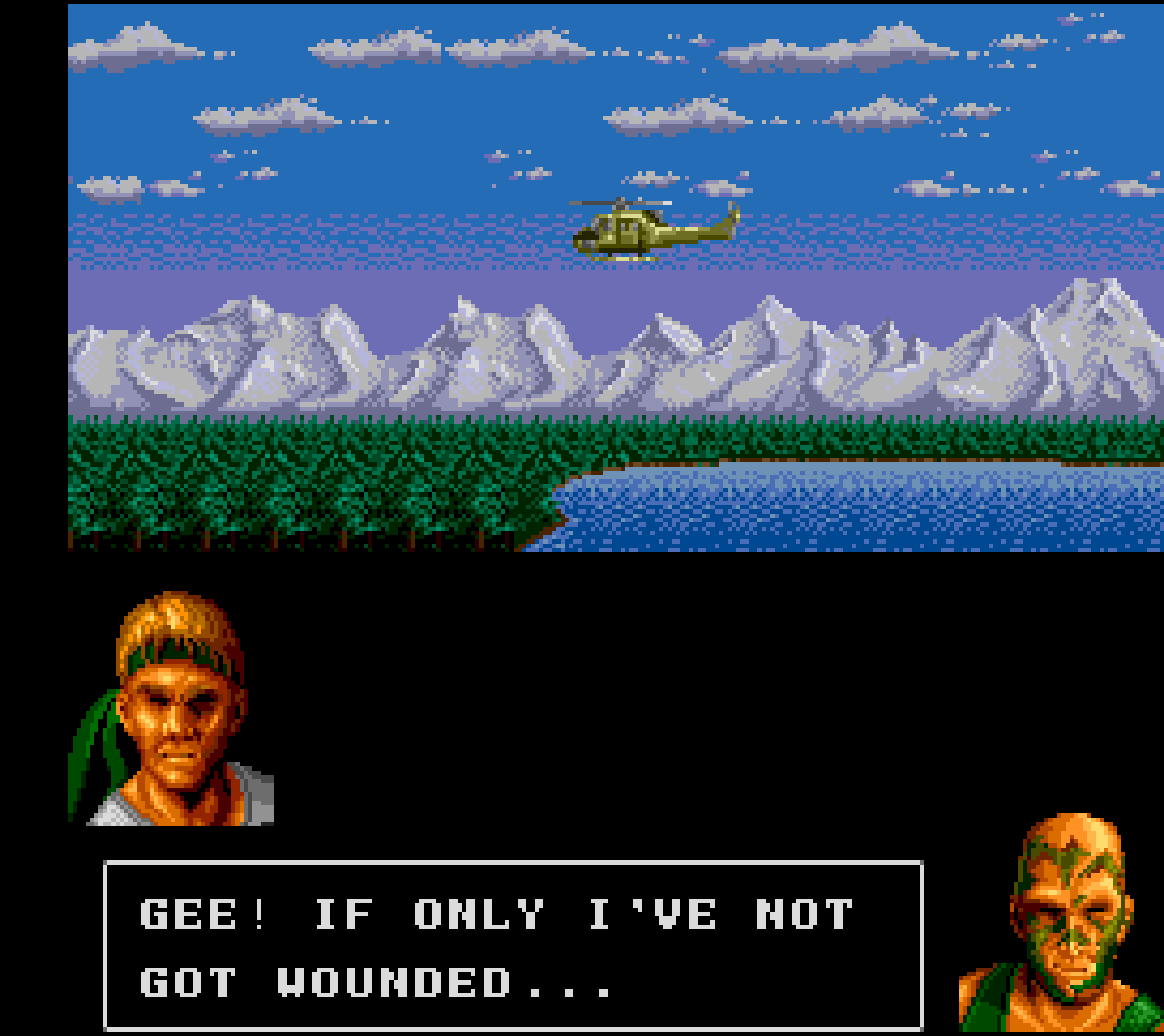

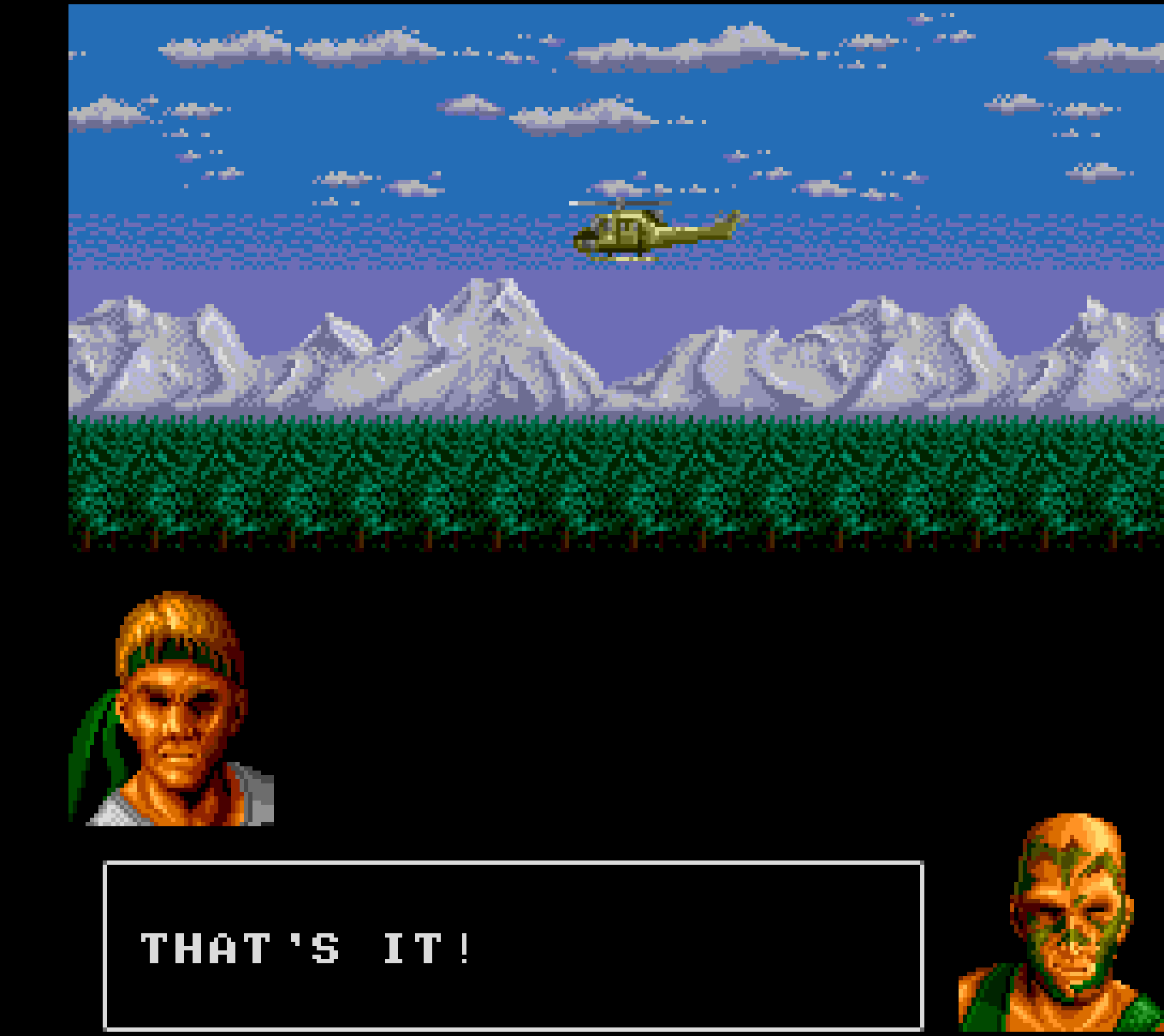
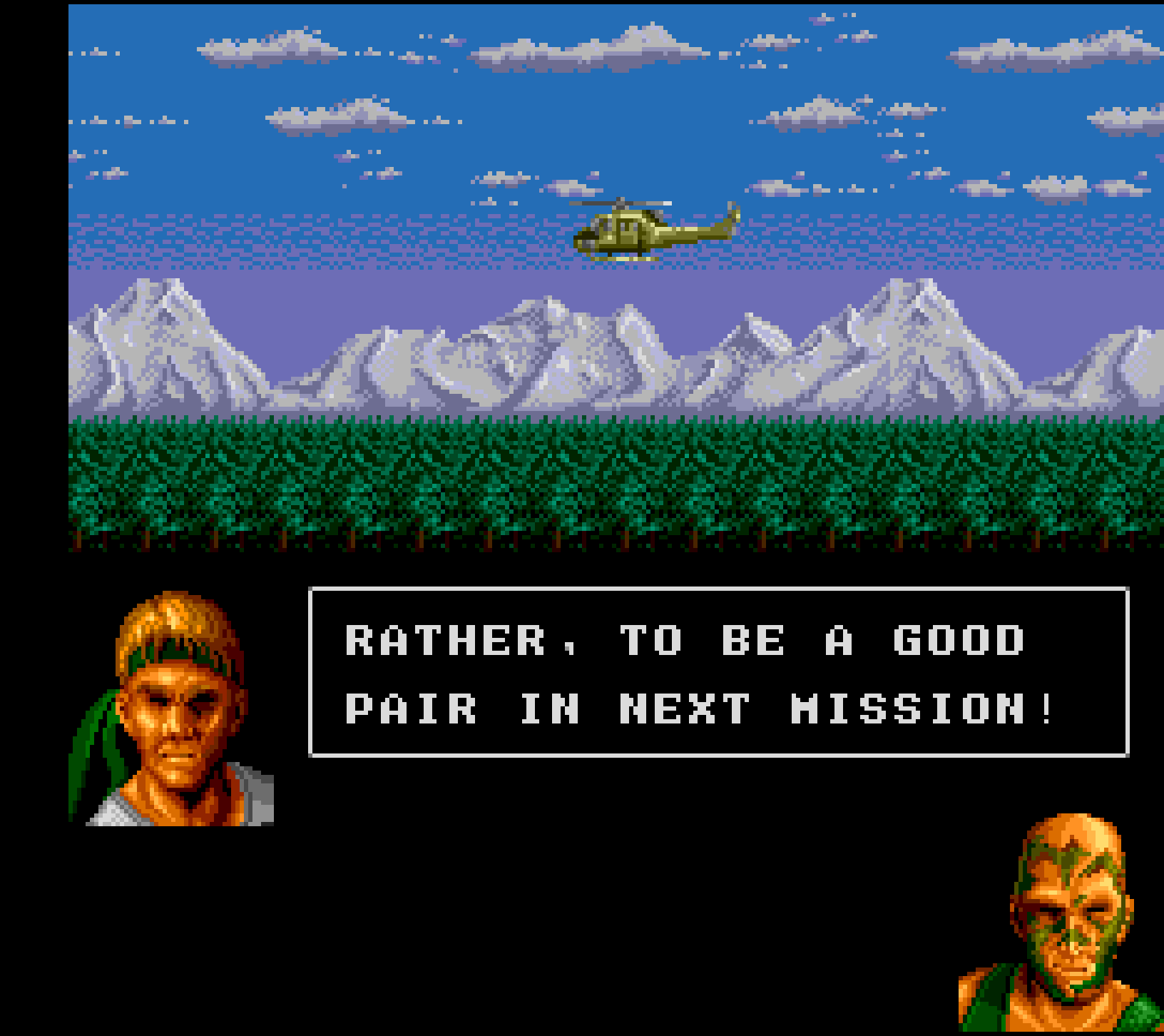

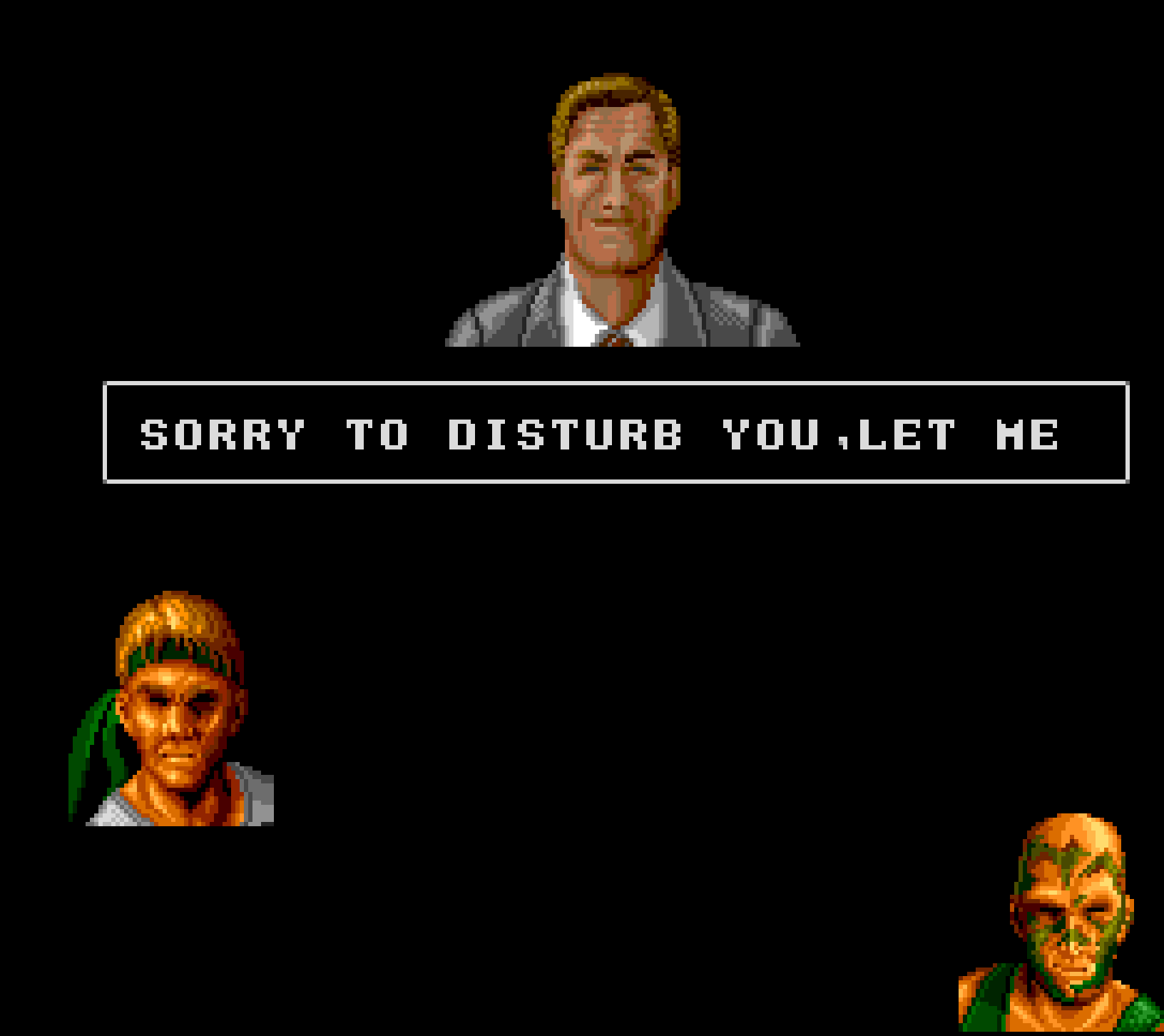
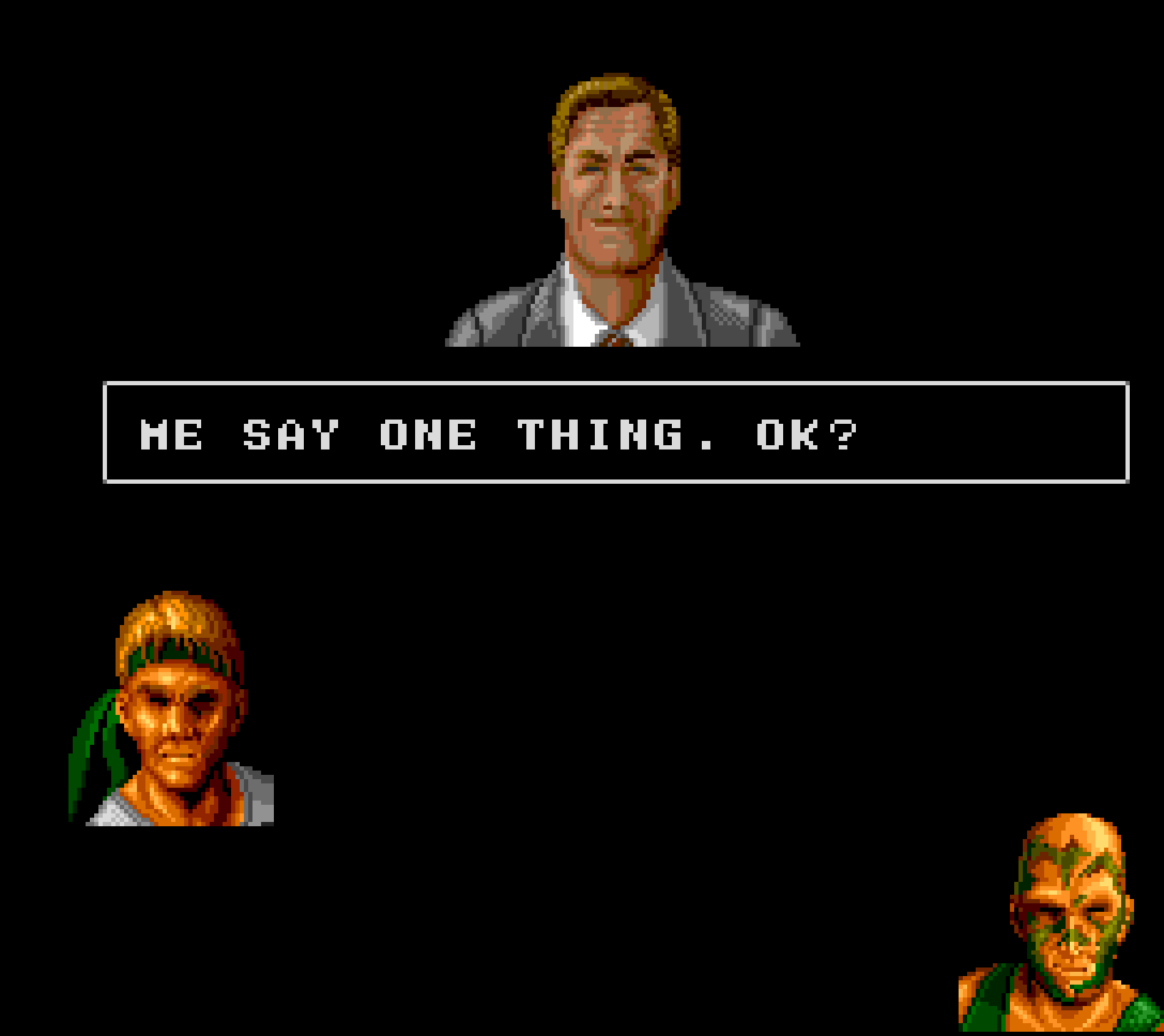
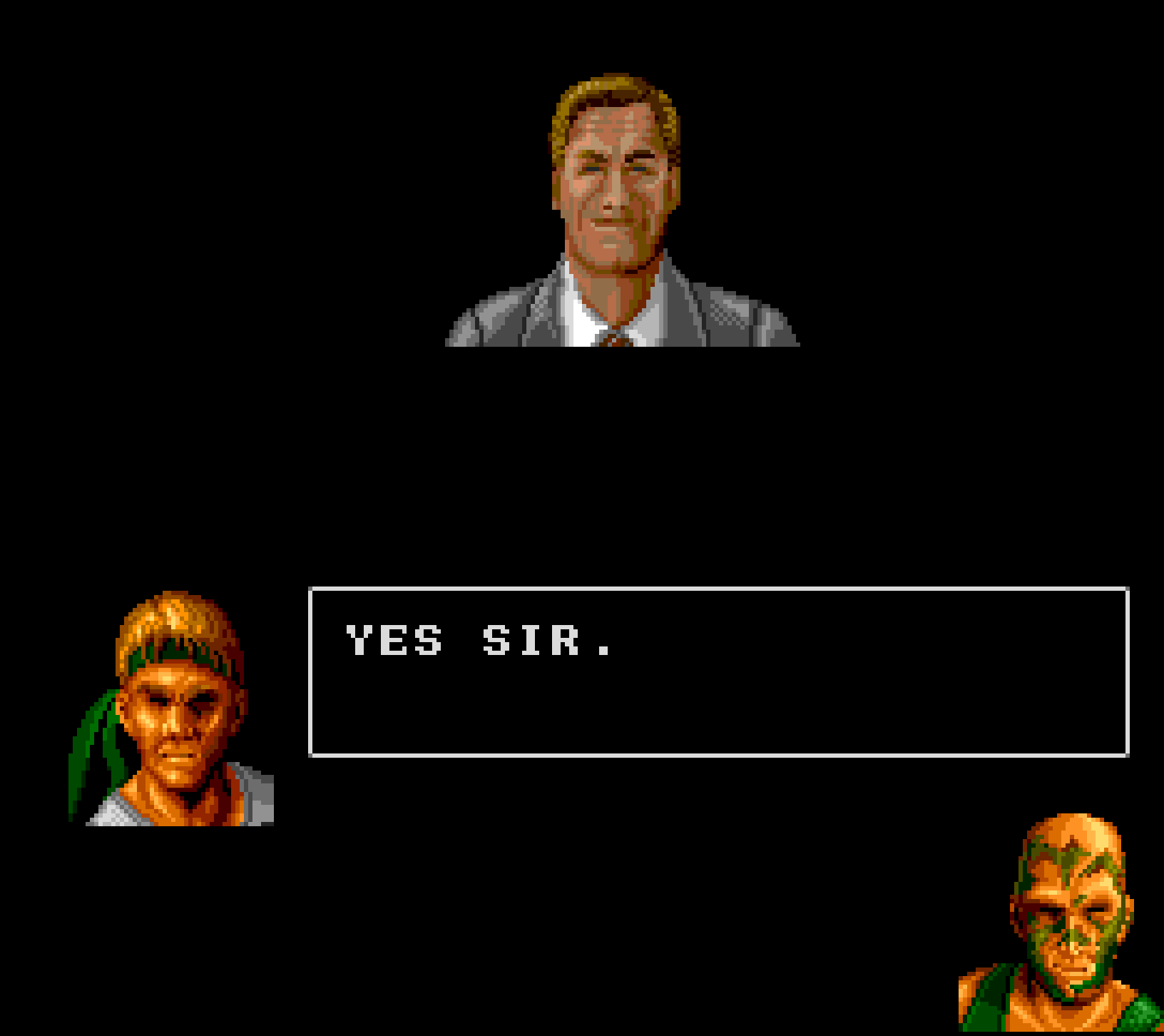
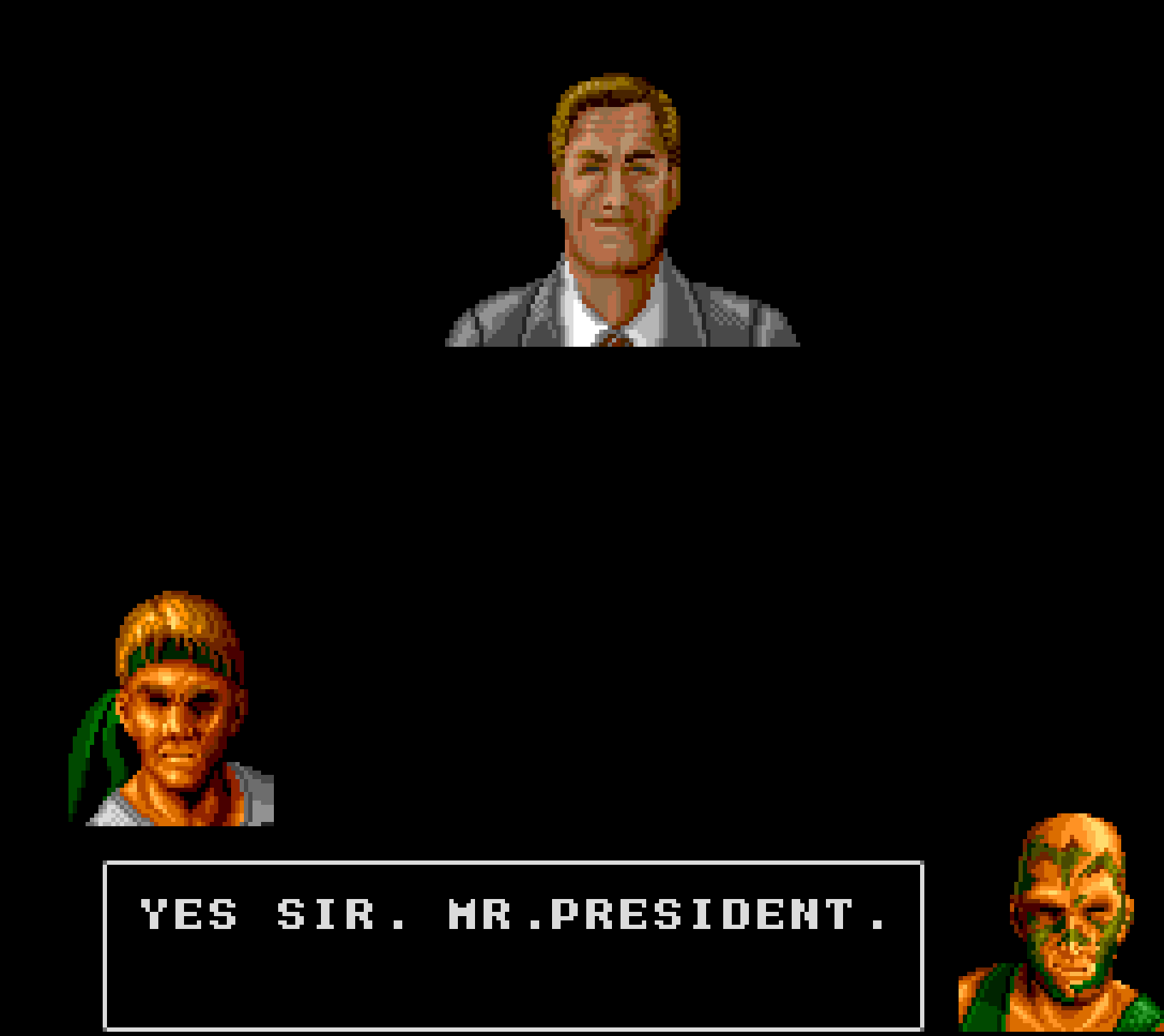

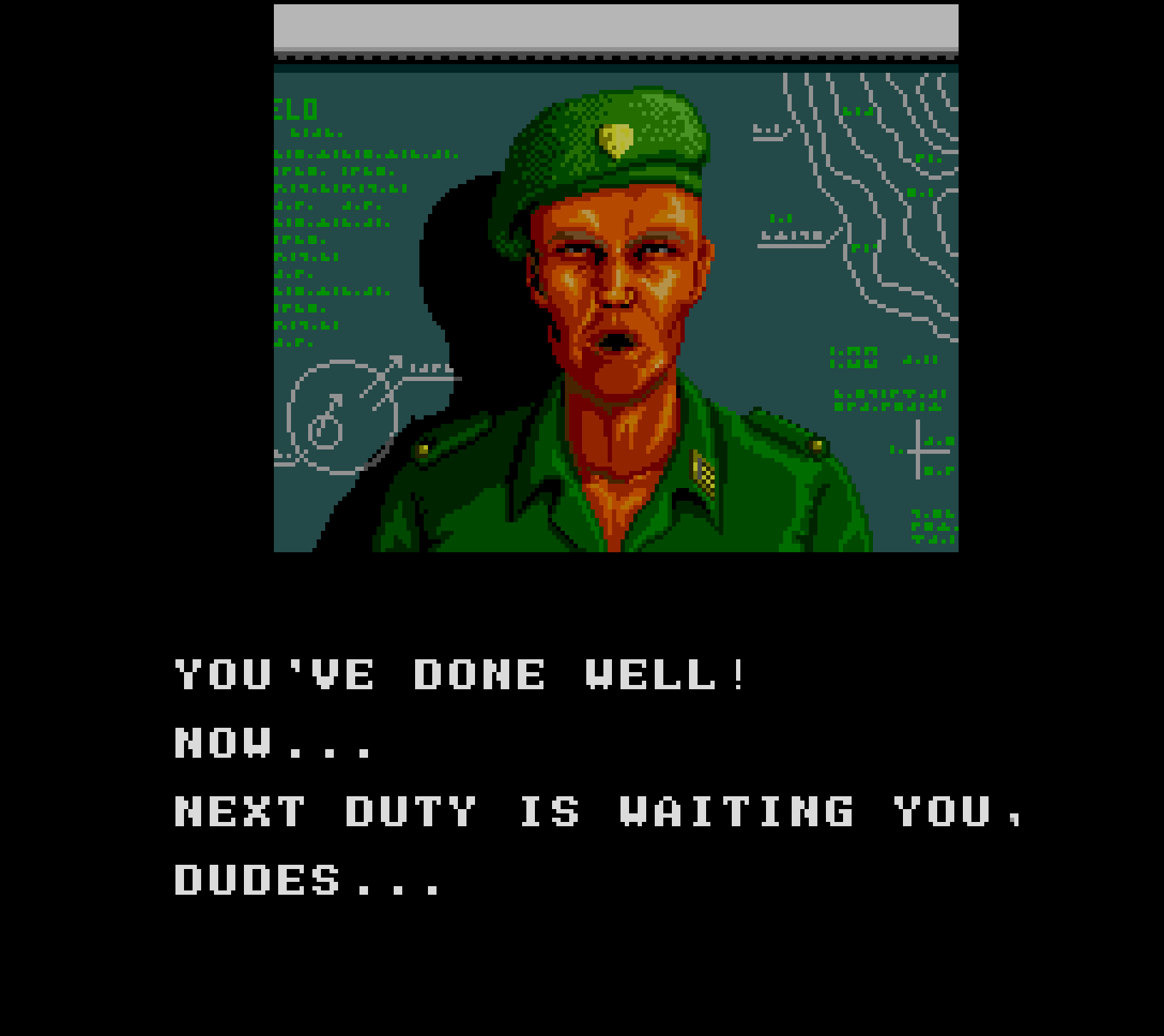
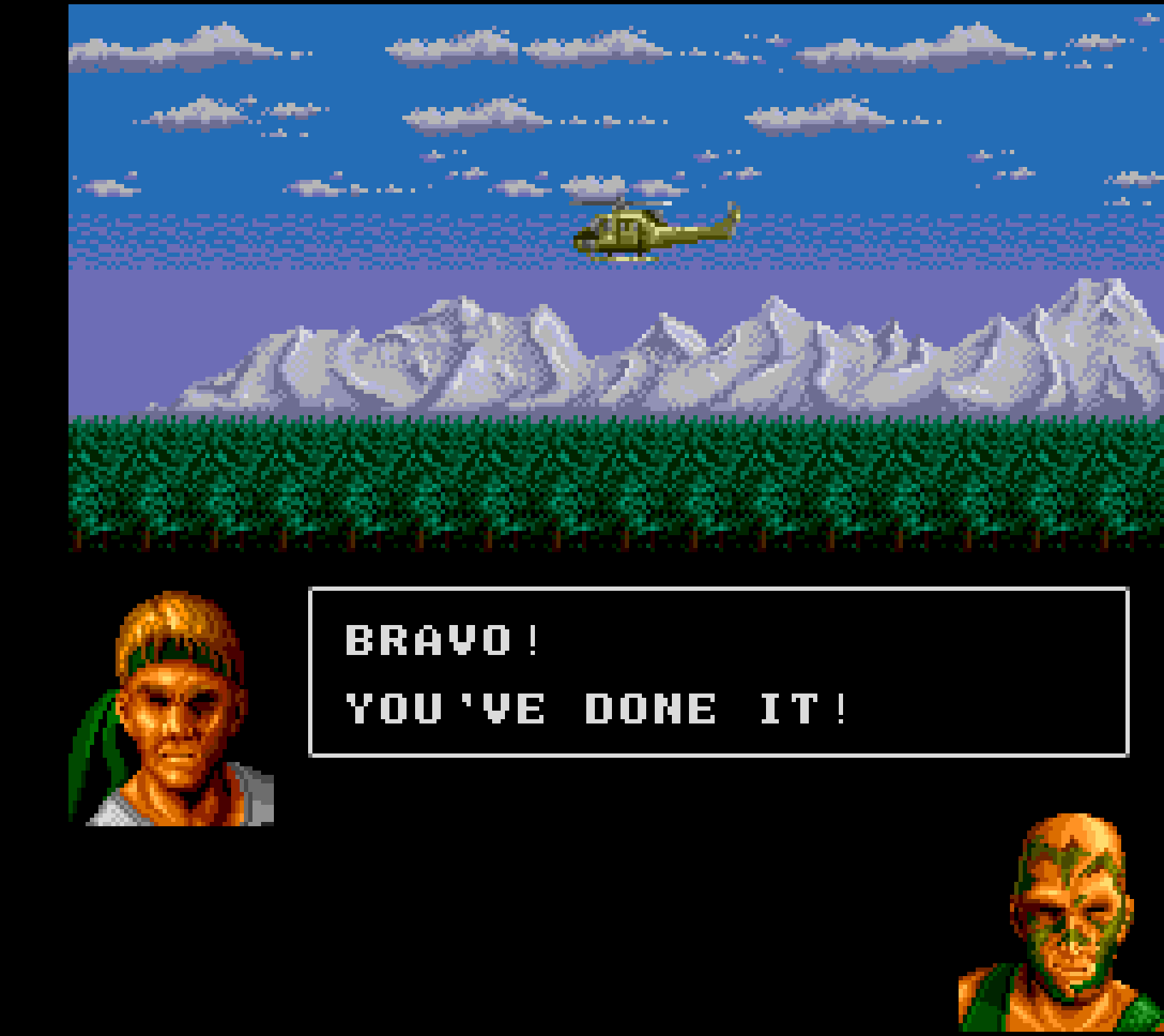
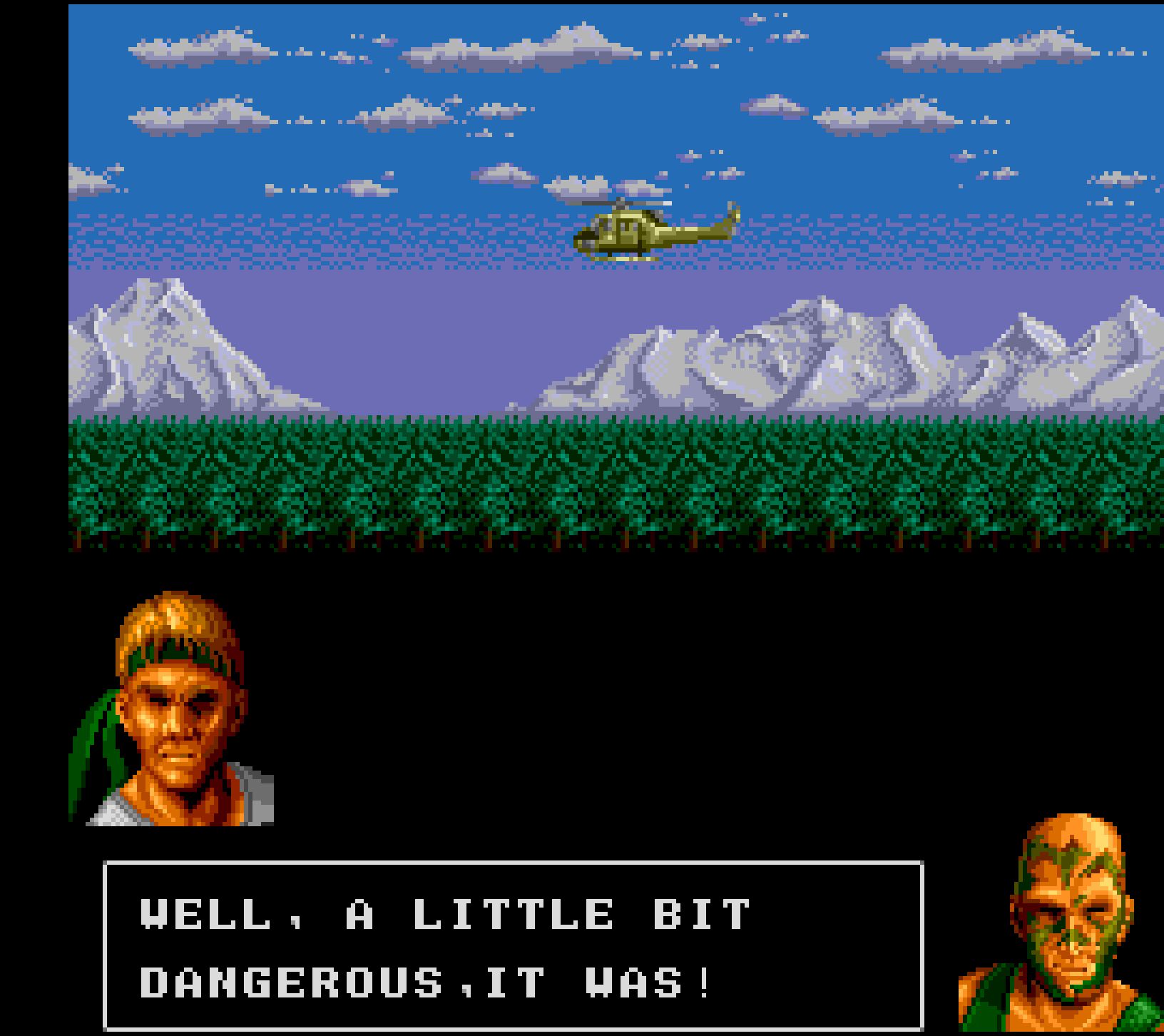
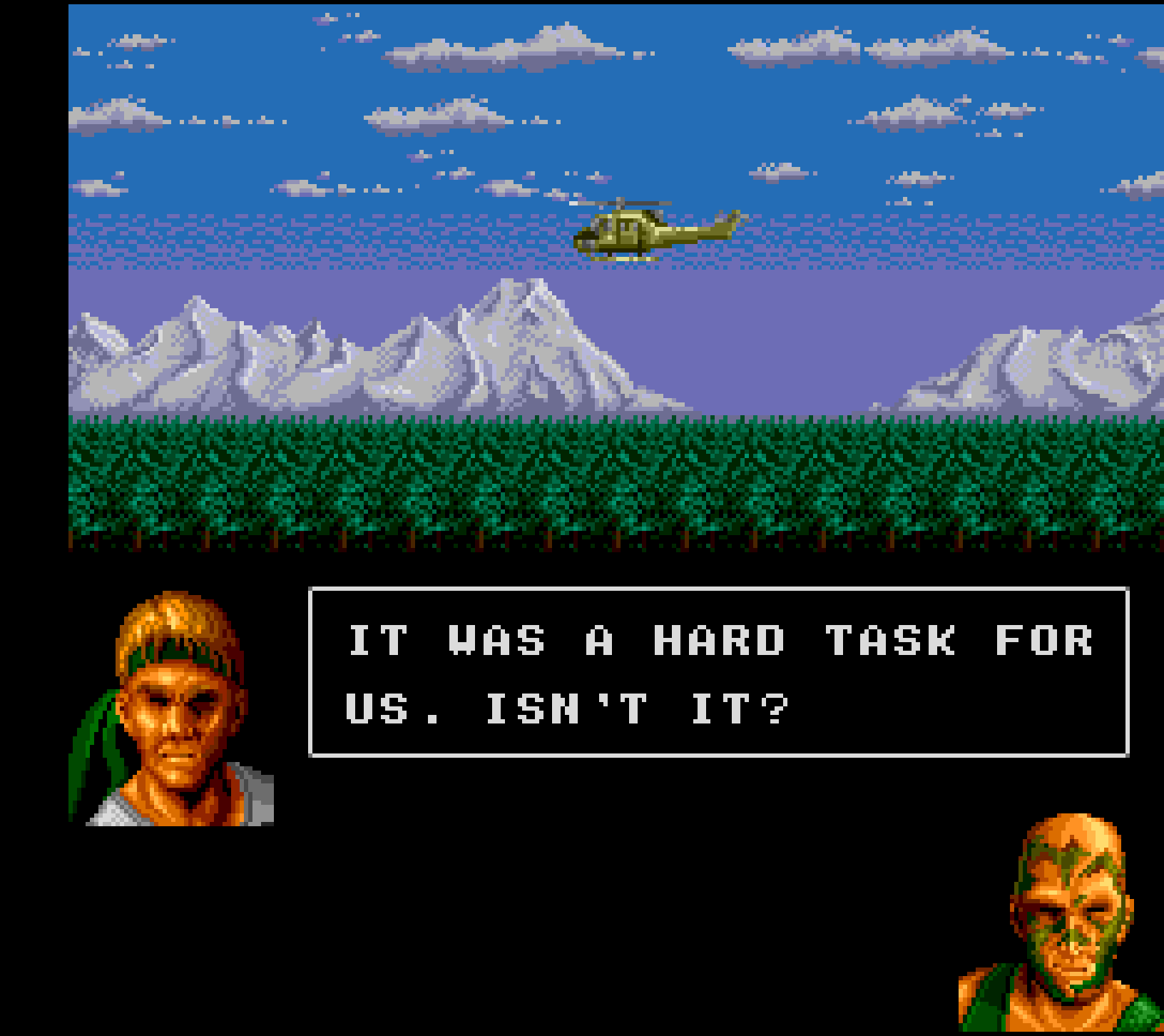
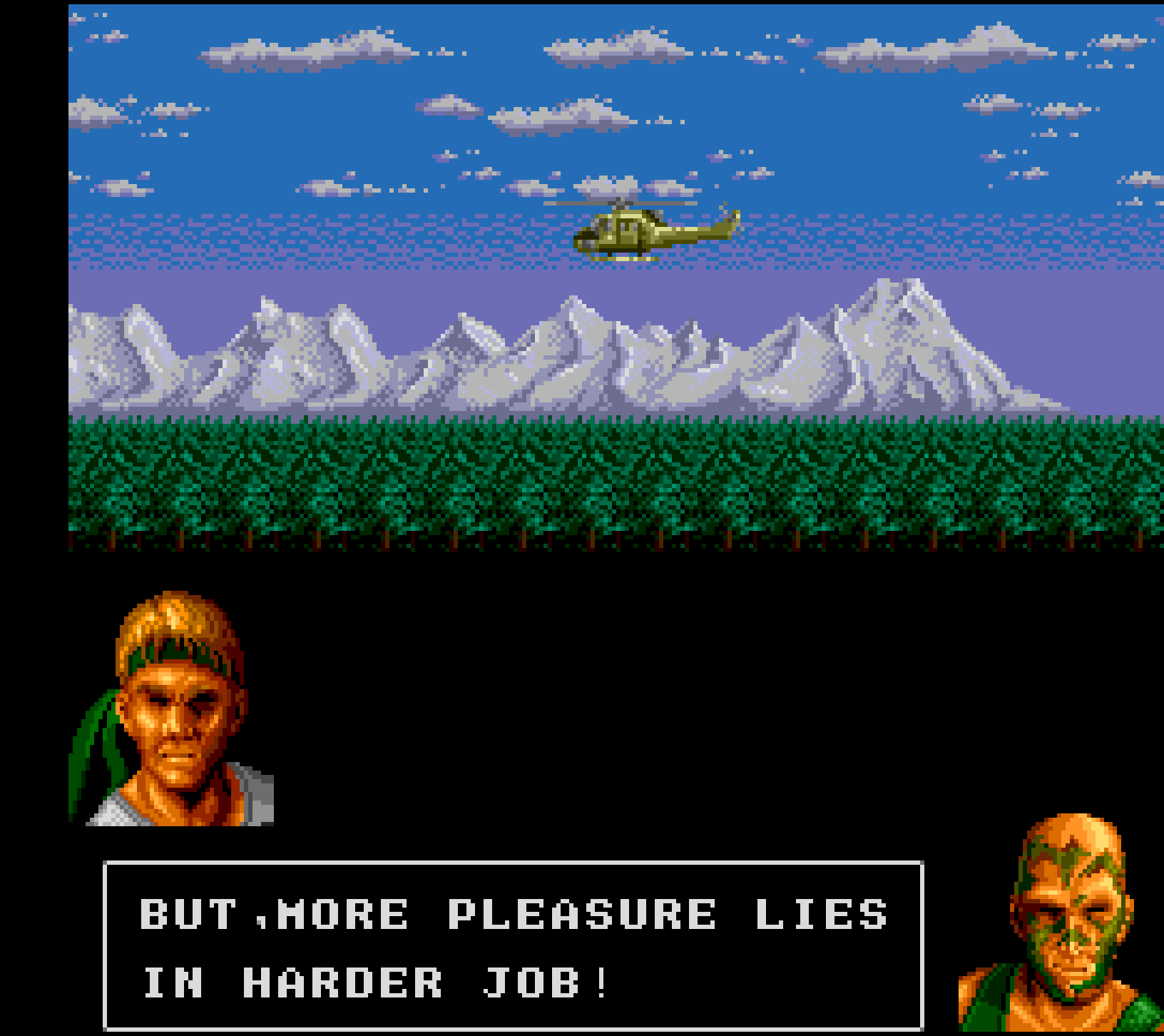
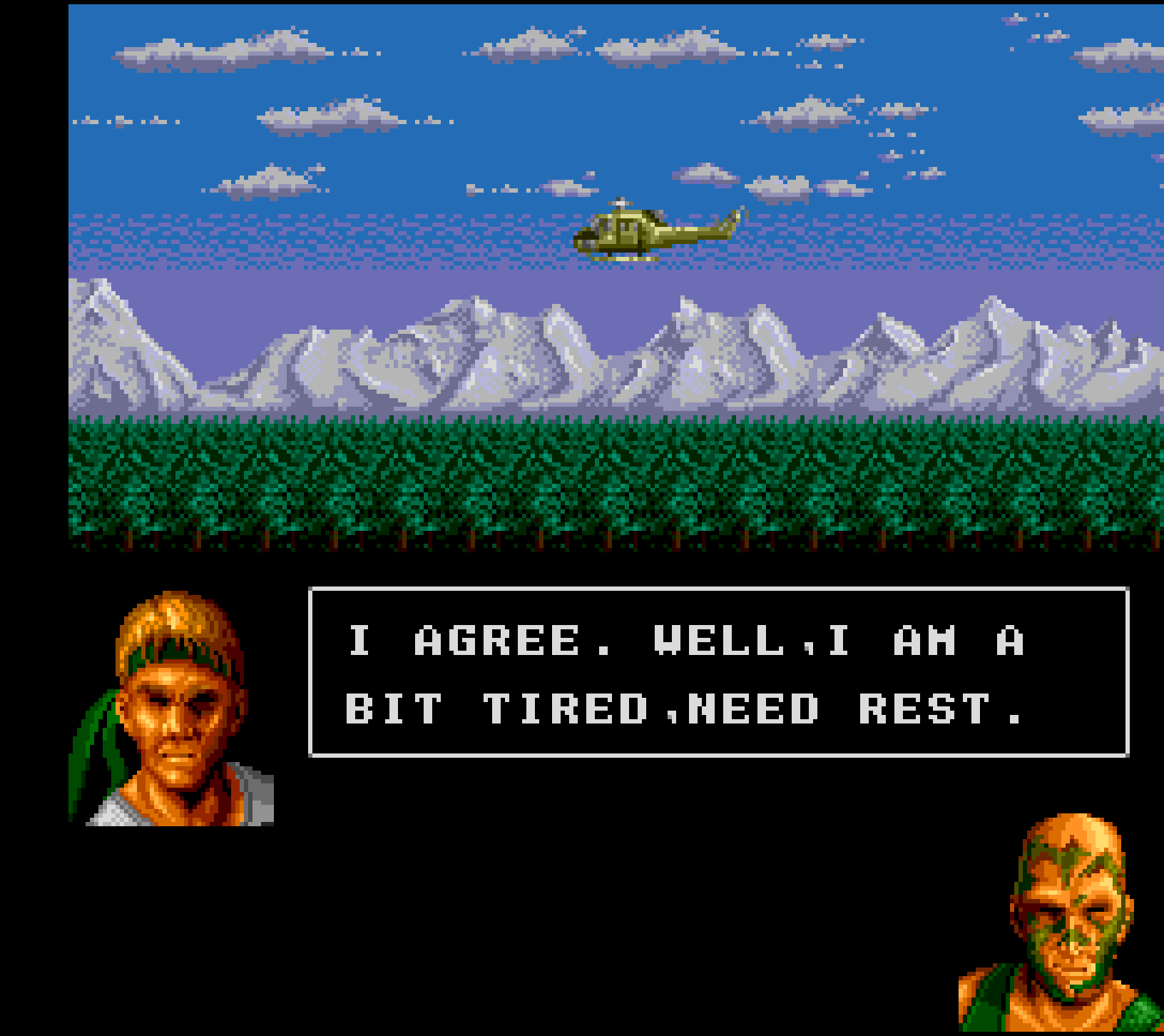
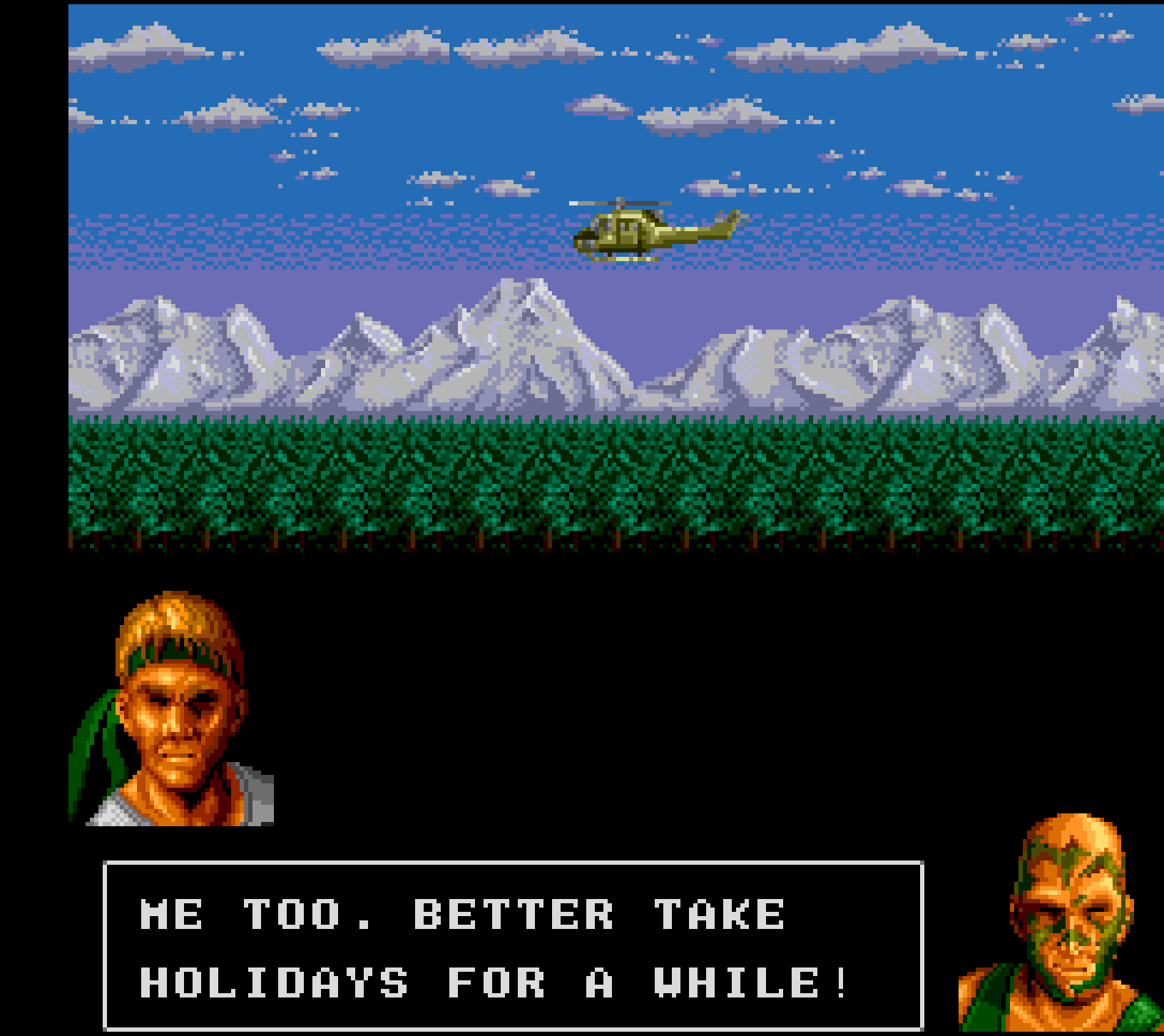
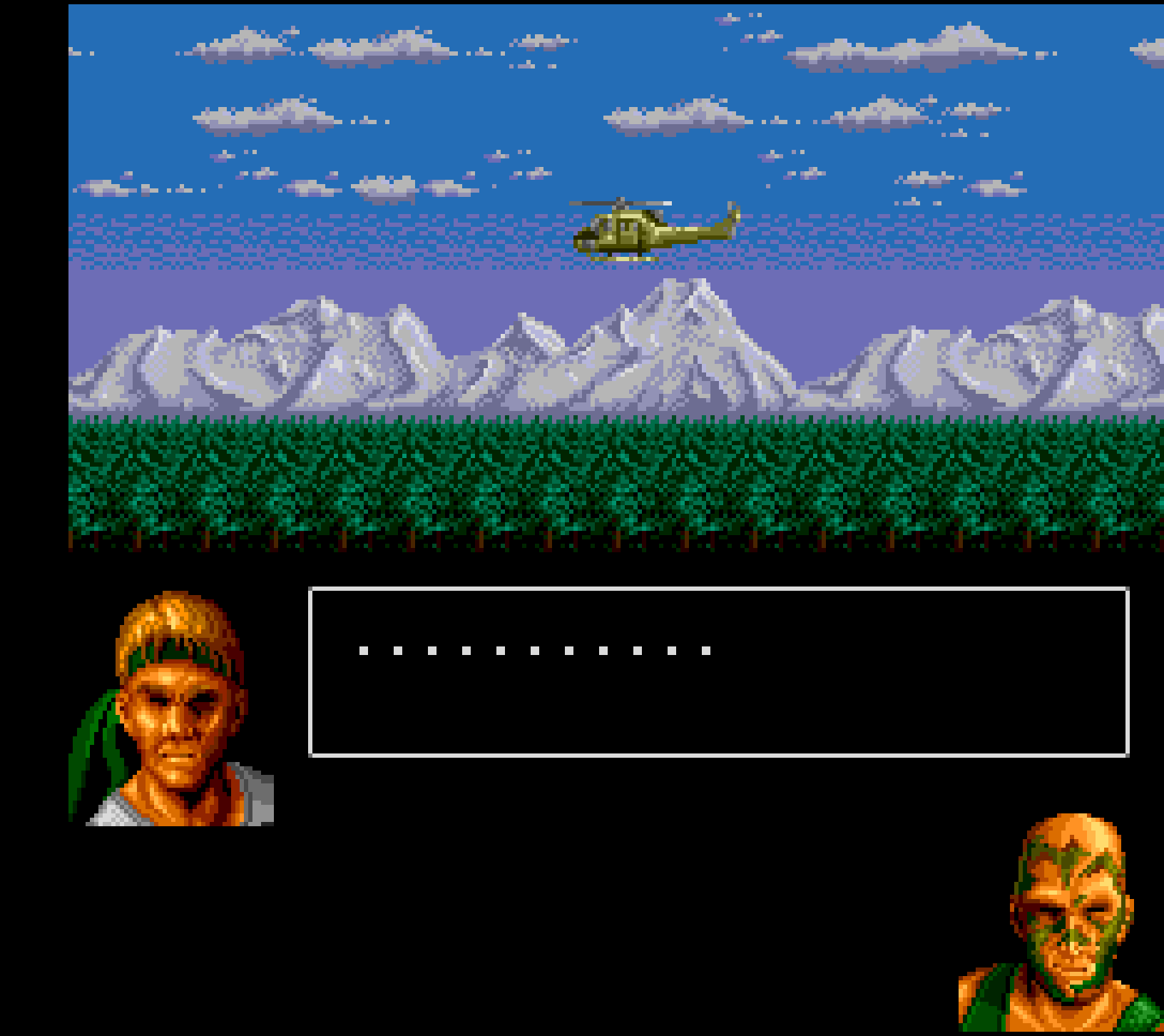
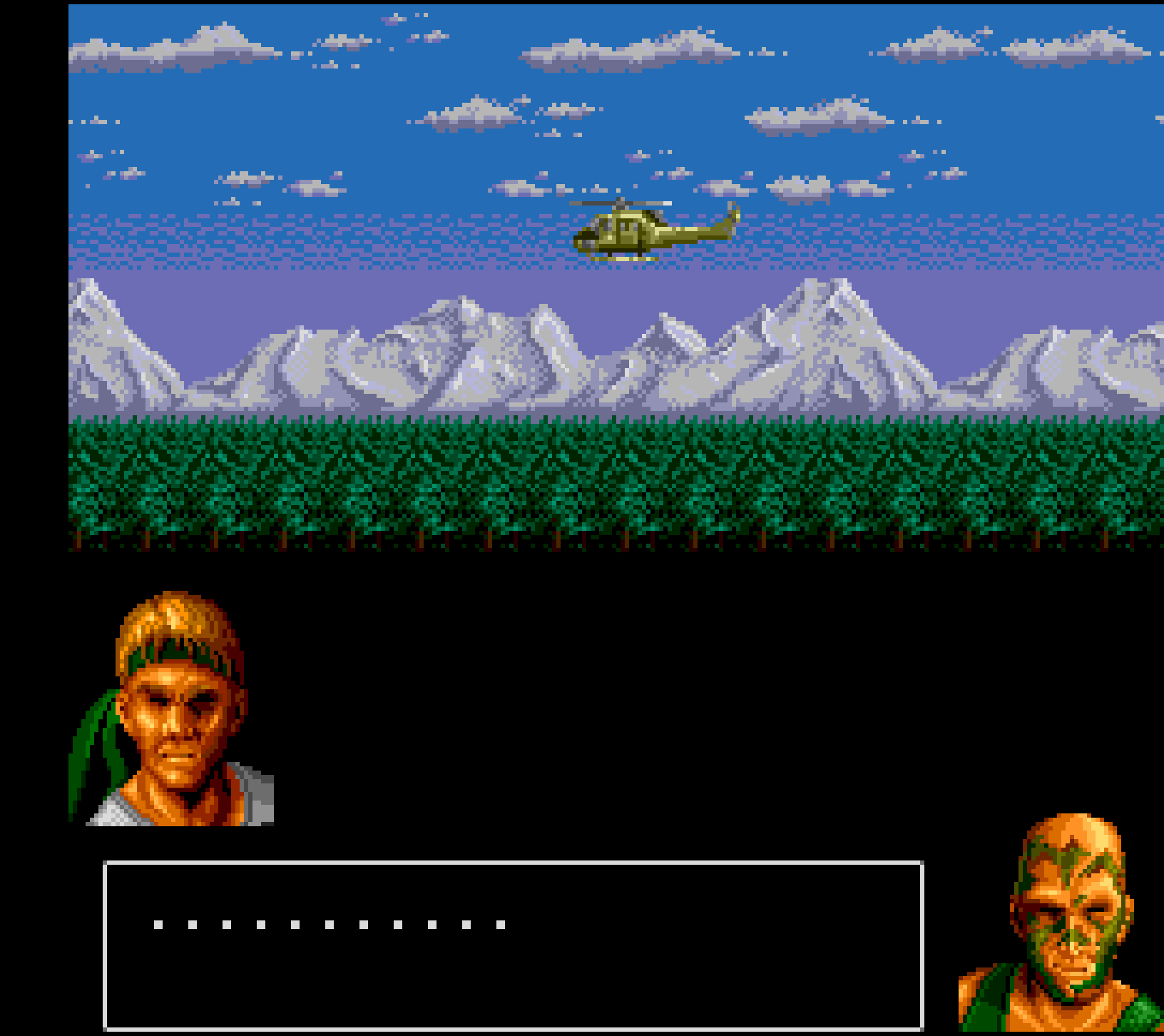

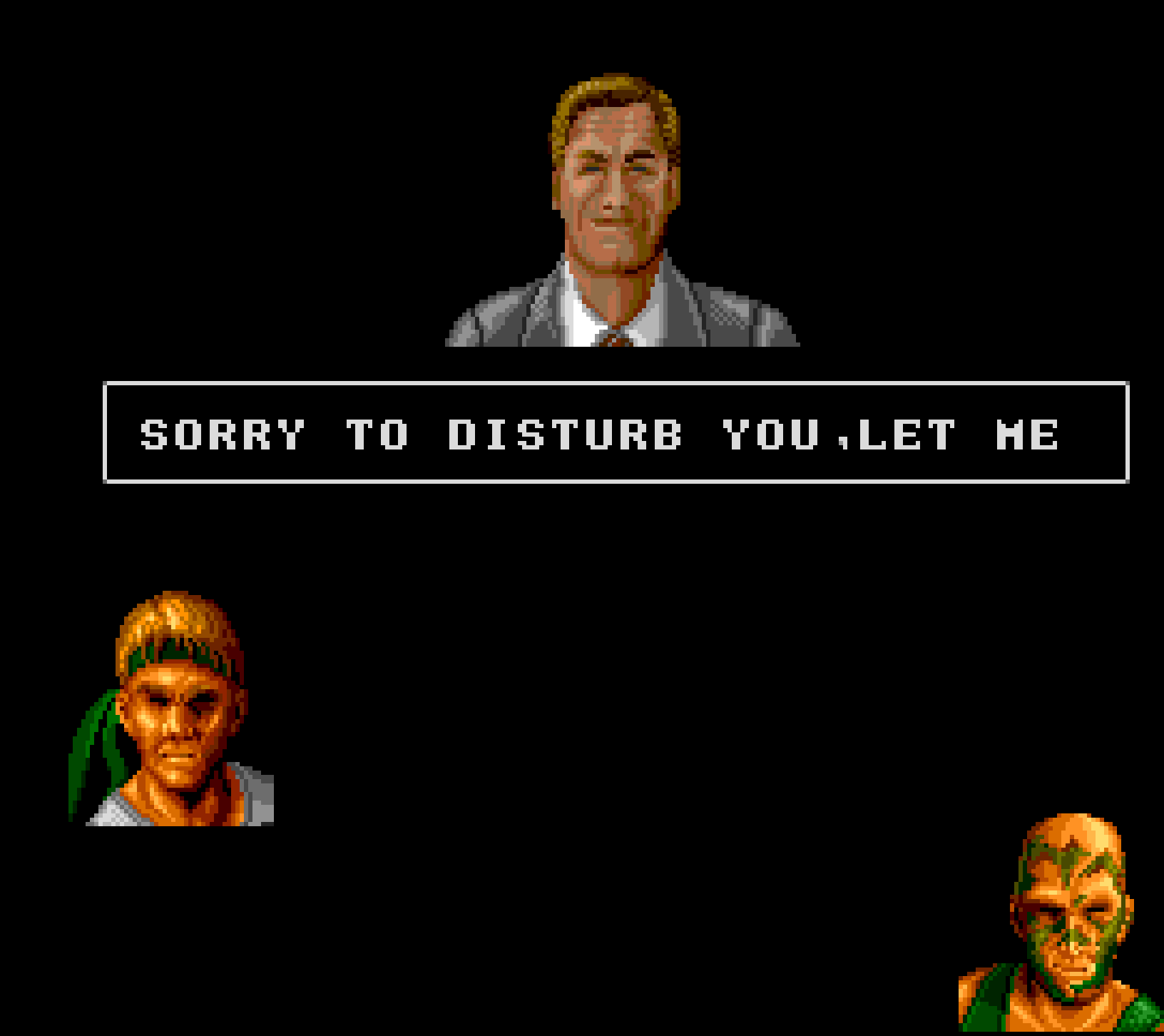

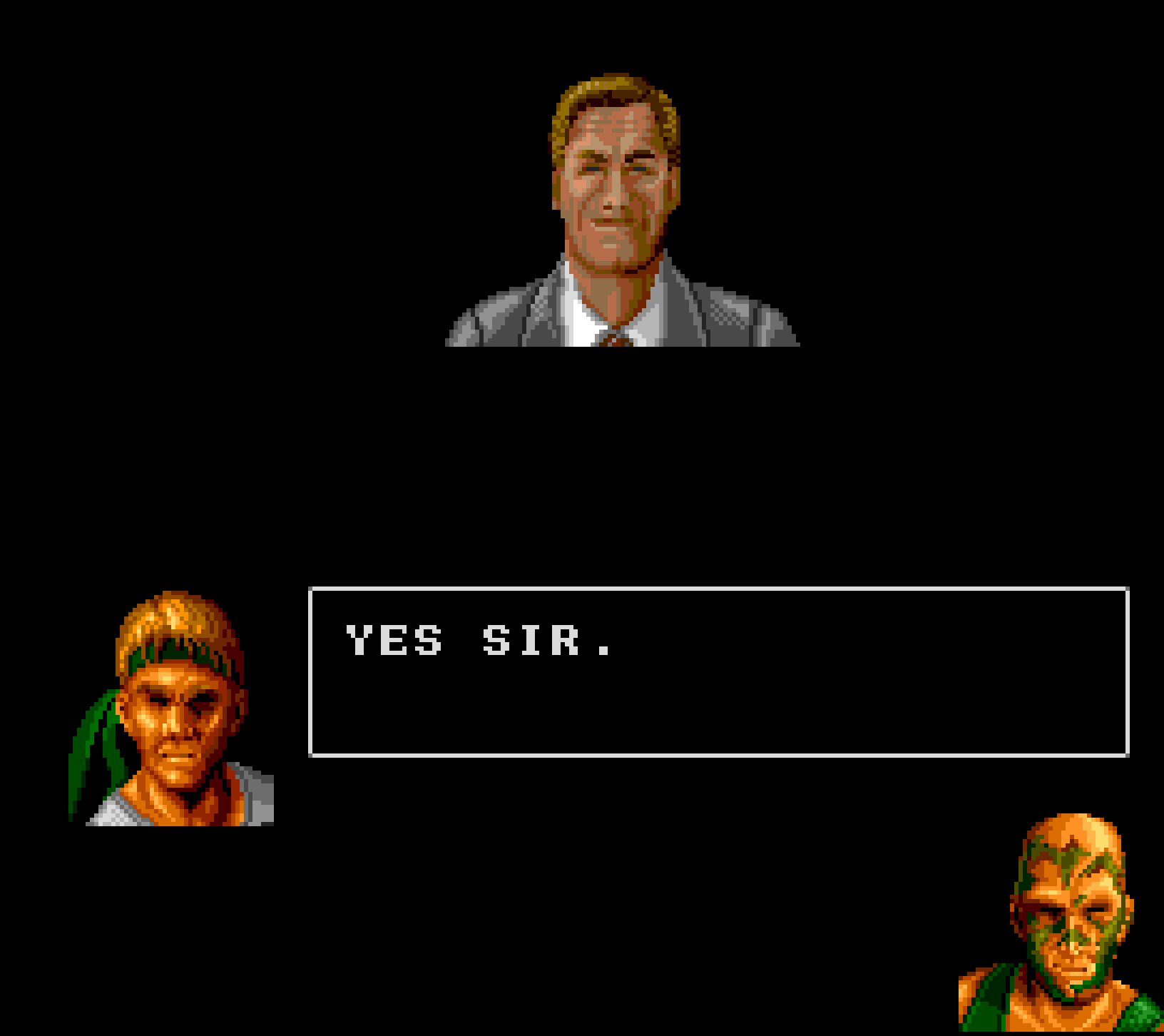
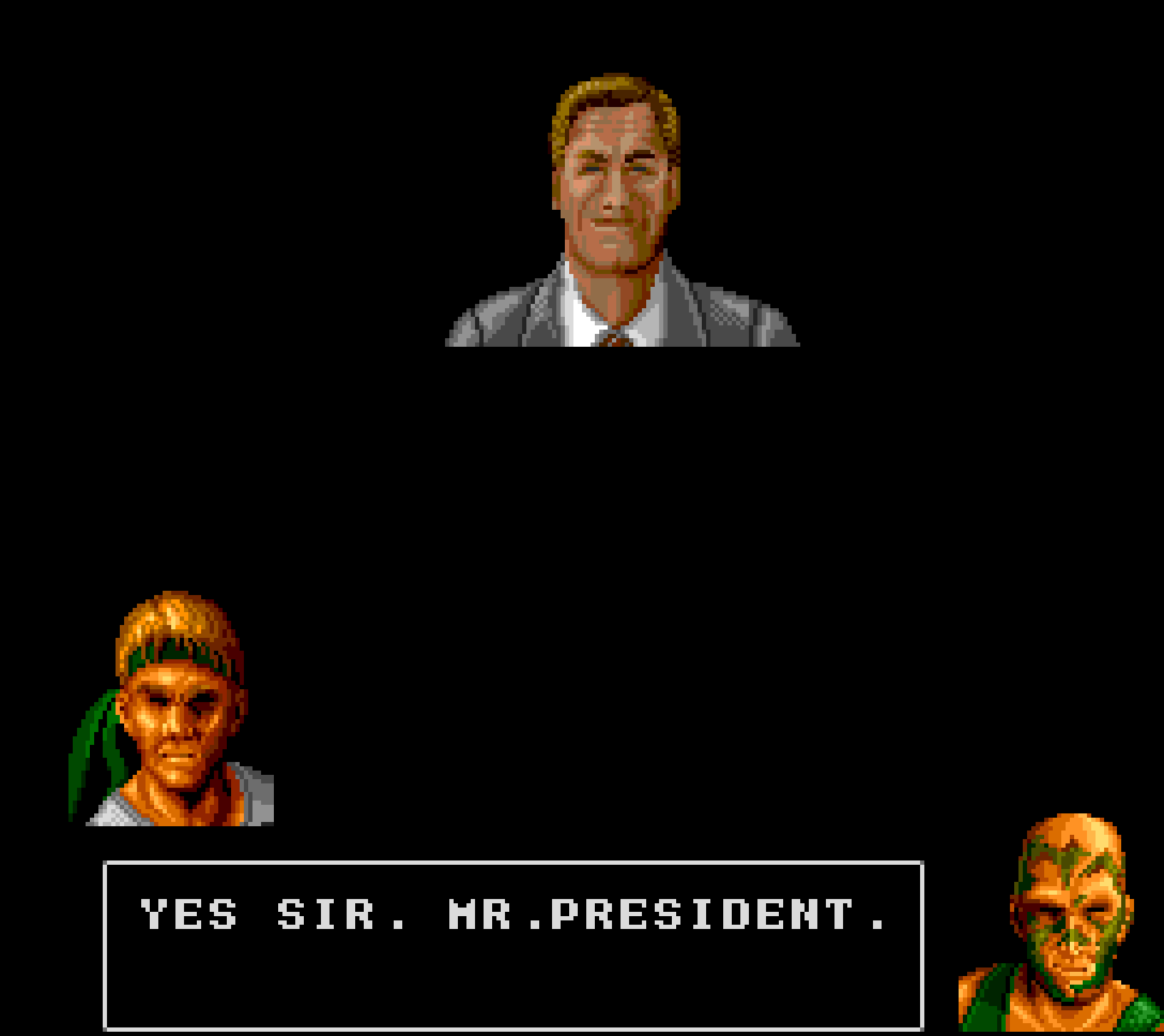


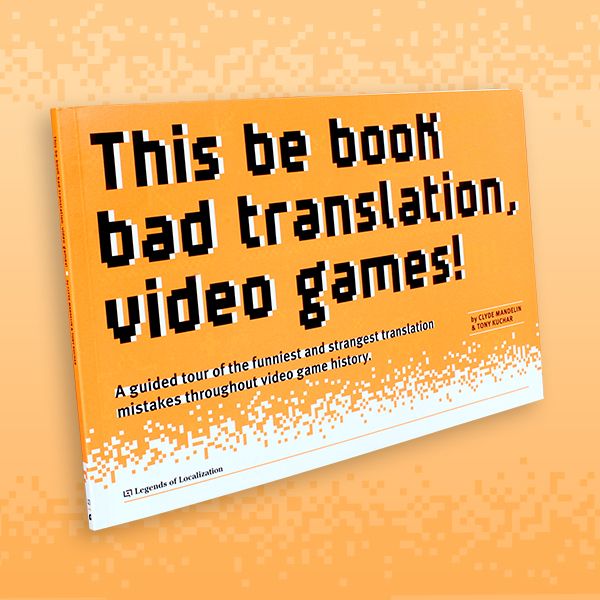
Great stuff Mato! Thank you for posting this!
“Heavens! How you’ve got here!”
Isn’t that Heauens, not Heavens?
Whoa, nice catch, I didn’t even see that before. Thanks!
Why do they even have two different version of the president’s text when he’s saying the same thing? I assume there was probably only one person who translated this whole game, so you’d think they would just copy/paste the text rather than translate it differently the second time (assuming he says the same thing in both Japanese endings, anyway, but the text is so close I can’t imagine it was different).
The only thing I can think is that whatever testing was done afterwards was only done in 2P, they noticed the mistake, but only updated the 2P version?
What’s interesting is they fixed the double ‘me’ part, but also changed the ‘OK’ to ‘Can I’ which actually makes the sentence sound even more awkward (at least ‘Let me say one thing, OK’ could be passible).
I guess “ultra-red glasses” is a cooler way to say he got… normal glasses.
I have an old chemistry book (~1925) that refers to what we would call IR-light as Ultra-Red.
Compare it to the Japanese script, the USA exclusive Bloody Wolf cabinet and the TurboGrafx translation
Bloody Wolf (AC)’s translation seems more competent in terms of grammar, yet substantially drier.
And that version also has a lotta cut out text…
But the Turbografx keeps the entire script, while also improving on it
I love how the one-player ending has the P2 character apologizing for missing the action. It is a fantastic little detail.
Oh, man, this whole game/article is gold!
“You stupid! You die!” must be one of the greatest lines in any game!
Curious about the repeated use of the word “guys”, though… is there a specific Japanese word that more literally translates to “guys” as opposed to “men”? Or do translators just choose to say “guys” because they heard it on an American TV show, or something?
Whatever the case may be, it probably explains “Eat this guys!” from Golden Axe: The Revenge of Death Adder. (Bit of context: This line is spoken by the very big, very evil overlord, with his dying breath! The tone is just a teensy bit too informal, I’d say!)
Yeah, there are lots of word like yatsu/yatsura, koitsu,koitsura, soitsu/soitsura, and aitsu/aitsura that get used all the time in entertainment and get translated as “guys”. There’s also minna which occasionally gets translated as “guys”. Then there are all the million different ways of saying “you” which get translated as “guys” when pluralized.
Thanks for clarifying- I didn’t expect that there would be so many ways to arrive at that one word in English.